




WE often hear about renowned and successful personalities from various regions across our beauti-

ful country. The Pepperpot Magazine sat down with Shakira Yipsam, a Field Officer attached to the Guyana Marine Conservation Society, who hails from the village of Aruka sub–district in Barima-Waini, Region One.

“I am a member of the drone unit and will be responsible for monitoring the man-
grove forests in the Barima-Mora Passage and providing the relevant agencies with the necessary footage to take corrective actions if necessary,” Yipsam told the Pepperpot Magazine.

Yipsam also revealed that she is responsible for capturing local photographs and videos of activities occurring in and around her community and sharing them on social media platforms.
The Field Officer further noted that she works with Vianne Frens from the Morawhanna community. She is also a member of the
Barima Mora Drone unit, responsible for monitoring the mangrove forests in the Barima-Mora Passage and providing the relevant agencies
How did she begin her career?
“I was a High School graduate, and after graduating, I was working as a CSO in my community and then the opportunity came along to do Drone Training. So, I took the opportunity with Conservation Society, and then I ventured off to do other training, including forest training, but I particularly love the drone, and I am currently the team leader right now,” Yipsam told Pepperpot Magazine.

According to Yipsam, as a team leader, it is quite an exciting job, being able to train other persons in the operation of drones.
“Being the first person in the family to launch into this career and my parents are extremely proud of me,” she explained. “A lot of persons are looking up to me. My family are all proud of me, so it is something that I want to continue doing,” Yipsam told the Pepperpot Magazine.
She is excited, because
the group that she is in is moving to do underwater drone training, which is the next level of training undertaken by the Guyana Marine Conservation Society.

Yipsam, Sarah Singh, and others have embarked on a venture to train young persons, particularly girls, in the drones in primary schools in the Barima Mora Passage area.
The training is being done to raise awareness of the valuable natural re -
sources of the Barima-Mora Passage, especially the mangroves, birds, mammals, fishes, and crabs.
According to Yipsam, this is a career that she would like to do and move on to an advanced career in technology in drone training.
“ This is something I would love to do and move on to more advanced technology in drones. I would like to move more and utilise my skills in doing documentaries, footage and images to other organisations and companies that will make full usage of it ,” the young field officer told this magazine.
The Guyana Marine Conservation Society, which has commenced a training exercise for its marine scientists to learn to pilot drones properly, is now planning to extend this initiative to six Indigenous girls who recently graduated secondary school in Region One (Barima-Waini).
According to Yipsam, Guyana’s largest intact mangrove ecosystem is found at the Barima- Mora passage in Region One. Efforts are being made to establish this site as a UNESCO World Heritage site.
Importantly, too, it is expected that this project will eventually be expanded to other young women in other parts of Guyana to aid in similar environmental monitoring activities.
CARLOTTA Boodie is a Guyanese Counselling Psychologist who makes no bones about the need to see her own therapist when mental health issues take a toll on her. It’s not hard to imagine why she’d become overwhelmed at times, seeing approximately 25 persons a week who are dealing with all sorts of problems affecting their mental well-being.
Now in her sixth year of this field, Boodie believes that her interest in listening to people and helping them through their woes dates back to 1994 when she decided to study Social Work at the University of Guyana. She recalls how people would share their problems with her, prompting her to get qualified to offer more than just listen to them.
She left Guyana, though, for the US Virgin Islands, where she worked for the Virgin Islands Domestic Violence and Sexual Assault Council, providing education, training and awareness around gender-based violence, including teenage dating, violence and stalking.


At this point, she realised that she needed to “re-tool” and acquire a certain skillset to optimise the position she had. “I saw a lot of trauma
and I thought I needed to do more than provide the education and training,” she shared in an interview with Pepperpot Magazine. And that’s when she began in the field of Psychology.
“I always felt called to sit with people to listen to
issues. I sit with people and create a safe, non-judgmental, confidential space for them to process their trauma and pain.”
As a therapist, she follows the ‘Rogerian Orientation’ in that her approach is client-centred. “I believe
them and help them,” she said, adding, “All of us at some point face mental health
the client has the ability to self-actualise; I may be meeting them at one of the worst
days or times in their lives, but they have the strength within them to make decisions for themselves.”
“My role is a supportive one in which I build trust, offer a safe and non-judgmental space for my client to process, heal and recover. I value human dignity and as such I provide care to all people. I am intentional about centreing my professional ethics, the foremost of which is confidentiality. Confidentiality is a big thing for me. When you come into a space with me, I honour you. It’s a privilege for you to share your story and pain with me. It’s precious,” she continued. Having worked with the Center for Court Innovation
in the Queens County Criminal Court, she has provided care for female-identified defendants and survivors of sex-trafficking.
This experience aids in the trauma-related work that she does today. “I worked a lot in high trauma, so I use a lot of trauma-informed principles when I engage with people.” For years, she said she has worked as a trauma specialist helping all kinds of people, no matter how they identify.
From her personal interactions with clients, she has found that top triggers of mental health issues have to do with domestic violence, childhood sexual trauma and anxiety. “In Guyana, it’s quiet


and people don’t talk a lot about it, but we have a high prevalence of childhood sexual abuse.”
Boodie shared that it sometimes becomes overwhelming to listen to the stories her clients will share with her. At times like these, she would especially need to call her therapist for a chat. “Some of the things that your client will walk through the door and tell you are shocking. I need mental health day myself. Sometimes I take half day or a whole day and don’t engage people. I have a therapist because I need to talk sometimes. Vicarious trauma is real. Sometimes I go to the seawalls and watch the water because that calms me.”
While she has to be careful about the emotions she shows while she’s engaging them, Boodie said it is when they leave that she has to check in with herself.
Irrespective of the downside, though, she finds satisfaction in her work. “When I sit with someone who is really in despair and I see them move from dejection and hopelessness; when I can see the growth and progress, I feel joy. When I see that change -- a light back in their eyes - it is just so rewarding.”
Boodie is hoping to expand her services by offering group therapy for a variety of persons who may be suffering from postpartum depression, grief; women and men going through a divorce or domestic violence; women who have abortions, etc.
IT is a proverbial saying that it takes a community to raise a child, nurture them, and make them a positive influence in society.
It is against this background, that the Sophia Community Development Association (SOCDA) was birthed over a decade ago by concerned residents of the Sophia Catchment area, who sought to influence positive change in the community.
The Pepperpot Magazine sat down with the Director of the Association, Sidney Nelson, who revealed that the purpose of the formation of this prestigious association, was to combat issues such as crime and violence, domestic abuse, environmental hazards, etc.
As a result, in 2015, the association was registered formally as a non-profit organisation by way of a trust deed.
SOCDA’s mission, vision, and purpose are aligned to address the development challenges of the general Sophia catchment area.
During the interview, he detailedtwo of the organisation’s main objectives. The first is to foster a sense of community identity by providing resources andopportunities to promote self-determination through educational andvocational training, civic engagement, community enrichment, andparticipation. The second objective is to provide effective programmes that enhance the well-being of community members, in particular,
their needs of health and empowerment and to successfully advocate on issues that are relevant to the community’s needs.
“After conducting a community needs assessment, in 2016 SOCDA launched a CSEC Night School Program. To date, this intervention has provided over 300 beneficiaries with the means of accessing a second chance at formal education. This intervention was later accompanied by a Pre-CXC Night School, which provided remedial support to individuals who were desirous of joining the CSEC night school program but lacked the fundamentals tocapitalise on the opportunity,” Nelson told Pepperpot Magazine.
He noted that over the years, SOCDA has undertaken several initiatives including food and book drives, community dialogues, needs assessment, etc., and made strategic partnerships as it continues to serve its constituents.One of the principal challenges the community of Sophia, and by extension, the association, has faced is a lack of resources. Resources to implement programs, provide relief to community members, etc.
Admittedly, in recent years there has been improvement in this regard, inclusive of the commissioning of amulti-purpose communitycentre in 2022 is one such example.
“Under the joint management of the Sophia Community Development Association, Community leaders, and the Council, this resource will serve residents for years to come,”Nelson said.
He reiterated that in spite of the challenges we might
encounter, SOCDA remains grounded by an awareness of the needs of the Sophia catchment area and a commitment to addressing those needs.
According to Nelson, SOCDA understands that the community’s needs are not static. Further, in the post COVID-19 context, the remaining vulnerability level needs to be measured.
“Hence the organisation will be conducting a community dialogue within a couple of months. The findings from this dialogue as well as from other needs assessment methods, will inform our post-covid intervention, in short as far as we can of achieving our principle objective, which is to address the community’s needs”, Nelson told Pepperpot Magazine.
Nelson outlined that many people have made a name for themselves and have been positively impacted byhaving gone through training at the Sophia Community Development Association.
Thus, refashioning the community and creating a model for others who are of the view that coming from a so-called depressed community, there is not a fair opportunity at excelling at the highest level.
SOCDA is a Community Development (NGO) that is aimed at empowering youths and residents through community participation & development.
SOCDA has started to promote education and youth empowerment as interventions to respond to increasing crime and violence in the community.
IRRITATION fibromas are caused by lip, tongue, or cheek biting or sucking. Frequently, the growth occurs opposite the small space between the teeth where the tissue can be sucked in. On the other hand, a papilloma is a benign growth that occurs on its own accord. The patient first becomes aware of the fibroma or papilloma by feeling or observing the irregularity or by frequent, accidental biting of the overgrowth of tissue.
Some people may observe a fleshy growth on either the gums or tongue or even a scaly lesion anywhere on the soft tissues of the mouth. Fortunately, most tumours of the gums and tongue are benign (non-cancerous). The most common growth is an irritation fibroma, which appears as a smooth-surfaced, pink mushroom, suspended by a small stalk attached to the lip, tongue, or inner cheek. The papilloma is also mushroom-shaped but with an irregular, white surface.
Treatment by excision (cutting out) is the usual cure. Since the diagnosis is obvious and the entire growth is removed without difficulty, a biopsy to check for cancer is not necessary. Avoidance of lip or tongue “doodling” usually prevents recurrence. If recurrence is due to a space between the teeth, then closure of the space with a small, fixed bridge may be indicated. However, once the growth is removed, it seldom recurs, and no further treatment is necessary.
Then there are bony growths, quite common in adults, in the middle of the palate or on the inside lateral or tongue side of the lower jaw. They are called tori and consist of a normal bone substance that, in the palate, appears as an irregular


oval protuberance and in the mandible more or less as small single or multiple marbles beneath the mucosa. The cause is unknown and completely symptomless. Occasionally, they grow large as to be traumatized by chewing or interfering with the wearing of dentures. Most people are unaware of their presence until a dentist or dentex points them out. Unless tori cause a problem, there is no reason to have them removed. If their size becomes annoying or interferes with the placement of a denture, they are removed by simple surgery. Once removed, tori does not recur.
A hairy tongue is a harmless elongation of the hairlike filiform papillae on the tongue’s top surface. The surface usually appears white but may be stained brown or black by tobacco or pigments in food. The condition occurs only in adults. A white-coated tongue is common during a dehydration illness, but what causes a hairy tongue in the absence of systemic illness is unknown. The condition is painless and noted only for its abnormal colour. Since food particles can collect in the hairy filaments, the tongue may emit an unpleasant smell. Both treatment and prevention consist of daily brushing or scraping of the tongue to keep its surface clean.
Leukoplakia, meanwhile, should be considered more seriously. This is observed more frequently among older males, and in persons using tobacco. Although most lesions remain benign, the condition can be viewed as pre-cancerous. Lesions vary in size from a few millimetres to many centimetres (an inch or more) across. It may be flat, fissured, or ulcerated with a somewhat rough and scaly surface, and whitish yel-
low, pearly white, or grayish-white in colour. Leukoplakia is usually found behind and to the outside of the lower molars, on the inside of the cheeks, and the floor of the mouth or the side of the tongue.
Leukoplakia occurs spontaneously or may be caused by irritation from heavy smoking, chewing tobacco, jagged teeth, ill-fitting dentures, and poor oral hygiene. The disease develops slowly and painlessly and a dentist discovers most times with the patient unaware of the condition.
When leukoplakia appears on the tongue or floor of the mouth, there is a very high risk of it developing into invasive cancer, so complete excision is recommended with mandatory biopsy. Constant monitoring by the dentist is required.
FINAL-year medical student, 26-year-old Shazam Somwar, has his hear set upon eradicating the stigma attached to men’s mental health and using his office as a qualified doctor in future to provide quality care to those who may not be able to afford it.

Raised at Kilcoy/ Chesney, Corentyne, Berbice, by his parents Nazir and Ramai, and being the eldest and only boy among three siblings, his passion for becoming a medical doctor comes from an ingrained desire to help others – a lesson he said his family taught him well.


Having applied to the Greenheart Medical University (GMU) in 2015 while in pursuit of a career in medicine, the plan is to specialise in internal medicine, with a subspecialty in HIV/AIDS.

“I have chosen to live by the inspiring Mahatma Gandhi quote: ‘Be the change you want to see in the world’” Somwar told Pepperpot
Magazine in an interview recently.
Starting out at the Albion Front Nursery School, he pressed on to the Cropper Primary School, and then New Amsterdam Multilateral. After graduating in 2013, he applied for work-study at the Anamayah Memorial
Hospital (AMH) in Belvedere, Corentyne and after
where he wanted to create a safe space for men to talk about their feelings, seek help, and improve their mental health. It’s a project that focuses on the empowerment of men. “In our society, if a man says he’s stressed out, or if he’s crying, people tend to laugh;‘you should man up and not be showing feelings.’ But that’s not the case because in reality, they bottle up those feelings and that can lead to suicide, abuse, etc.”
Even as he did online sessions during COVID-19, in April 2022, he started a radio program on MAAD 97.5 FM with the same name Project MENding Mindsets, with the goal of being able to reach more people. “Even though I have added quite a
few new things to my portfolio, I remain committed to suicide prevention advocacy which has propelled me to give attention to the crucial area ofMental Health which I believe all human beings should be au fait with,” Somwar shared.
He said his love for humanity, personal experiences, and seeing things being neglected inspires the work that he tries to do. “In anoth-
two months of work-study,he was employed as a Pharmacist Aide at the AMHPharmacy.
“I remained in that position for one year and I believe because of my outstandingperformance, my employer decided to enroll me into a Phlebotomy Technician programme. On completion, I was moved to the AMH Laboratory, where I functioned as the PhlebotomistTechnician for one year before deciding to head to medical school.”
As he continues his studies, Somwar has been using his time to host sessions in schools, businesses, and non-governmental organisations to educate them about the fundamentals of human rights. At one point, he focused on general mental health awareness but eventually decided to make it more specific to men and mental health.

And that’s how he started Project MENding Mindsets,
er ten years, I see myself as a successful medical doctor and someone in society who has made an impact, not politically, but in a humanitarian way, and to see the stigma attached to men’s mental health being removed completely.”
It was in 2018 that Somwar developed an interest in human rights advocacy. He was tasked with representing Guyana at the United Nations Headquarters in New York City for Youth for HumanRights International Summit and was named President of the Youth for Human Rights BerbiceChapter. “This gave me the opportunity to represent Guyana once more at the United NationsHeadquarters in New York City and also the chance to speak in front of many Ambassadors andother officials about my Human Rights work in Guyana,” he recalled.
Furthermore, he was also certified as aHuman Rights Consultant by the United States Institute of Diplomacy & Human Rights.
“I believe with my years of service to Guyana in the field of volunteerism and humanitarianservices, I was nominated for the 2019 Ignite Caribbean 30 Under 30 Caribbean AmericanEmerging Leaders Award which I received in Washington D.C. U.S.A on June 7, 2019.Today I am a proud 30 Under 30 Honoree.”
ANIL Datt Persaud is doing his utmost to provide extra-after school lessons for learners in his community, even if it requires renting a bottom flat specifically for that purpose.
The 40-year-old is a
Church.
He has been in the noble teaching profession for the past 11 years, but his true calling is ministering to the people, and he creates the perfect balance of teaching and ministering.

and was drawn to the word of God because he wants to make a difference in the lives of people by spreading the Gospel.
He is big on his purpose in life and will do whatever it takes to ensure he fulfils his role in the church and school.
Persaud wasn’t always a teacher and a pastor. He worked at Guysuco as a Field Supervisor for 10 years before he embarked on his pastoral journey.
For his after-school lessons in East Canje, Berbice Persaud has 35 learners on roll and he teaches Mathematics, Technical Drawing, Integrated Science, Chemistry, Biology and Physics.


Persaud reported that he resides in the church compound and doesn’t have the space for the extra lessons. He was forced to rent the bottom flat of a two-storey house nearby.
He originally started his spiritual journey at Grace Pentecostal Church and he is from Adelphi Village.

Persaud has been practising a leadership role in the church for the past 12 years
Of the students present at his extra after-school lessons that day the team visited was Aarav Persaud, 14, whose mother permitted him to speak.
He stated that he was a slow learner in Mathematics and attending the lessons gave him that extra boost and he has improved significantly.
He has been taking the extra lessons since he was in Form Two and he is presently in Form Three and is doing way better academically.
The teacher/pastor told the Pepperpot Magazine that he started the extra lessons because there was great need for them and it is his way of contributing to society.
The Crab Enterprise Ravindra Premsukh and his pregnant wife, Haimwatie Rampersaud started out a
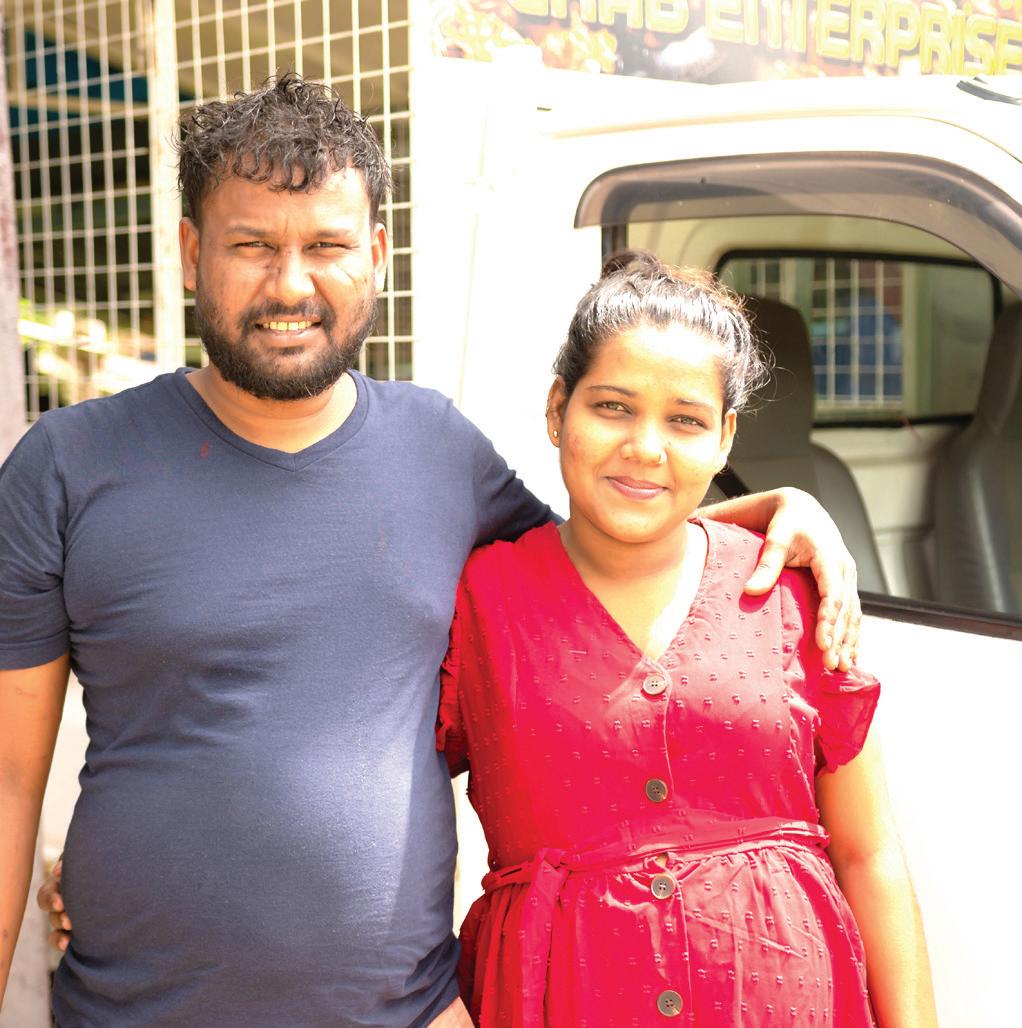
small business jointly with a relative. However, they were doing well until the relations were severed.
Today, the couple are trying to keep their business alive in order to acquire their own house and land to be able to become licensed seafood handlers.
Premsukh told the Pepperpot Magazine he had to scale down his business considerably and is barely surviving.
He explained that it is a royal run around to get his seafood licence and there are so many challenges, but he wants to do the right thing to have a legal business.
Premsukh added that he has been clutching at straws for the past nine months and even had to give away some of his freezers because nothing is happening for him in terms of business with so many stumbling blocks in his path.
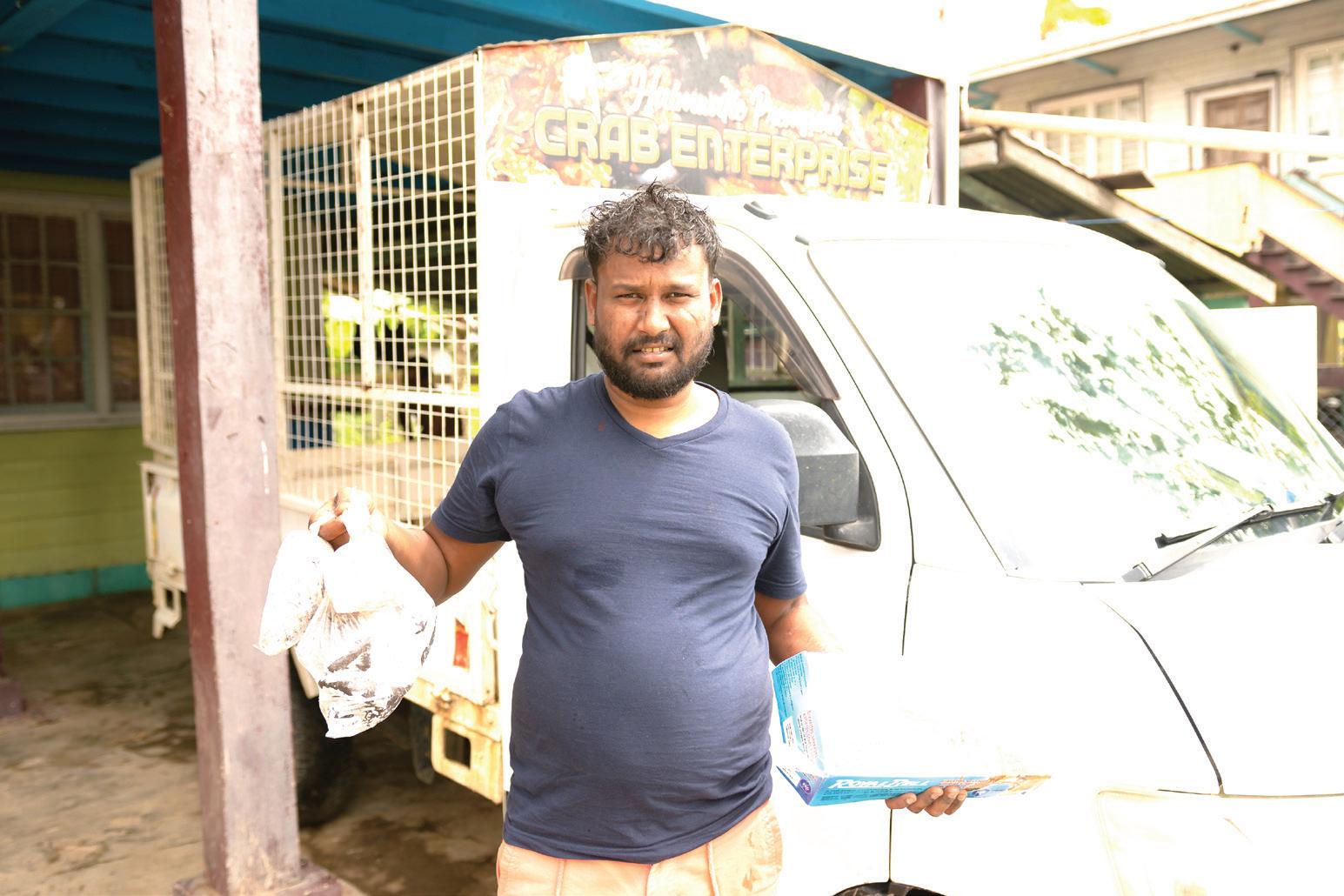
He pointed out that he does drive and sell crab meat, fish, kreteah, prawns and shrimp already cleaned, fillet and packaged.
The small time businessman noted that he is renting a house in Second Street, Adelphi Village, East Canje, Berbice and has other bills to pay so being idle is not an option at this time.
His wife is heavily pregnant and she is the mother of two and they have to press on to reclaim their small business to be self-employed.
RAJMATTIE Haimchan-
drijiis 84 years old and when asked what the secret to her 67-year marriage to her husband, VishnudatHaimchandriji, 87 is, the couplecredits mutual respect. Together, they brought up nine children and still exchange happy relations with their extended family at Reliance Abandon, East Canje Berbice.
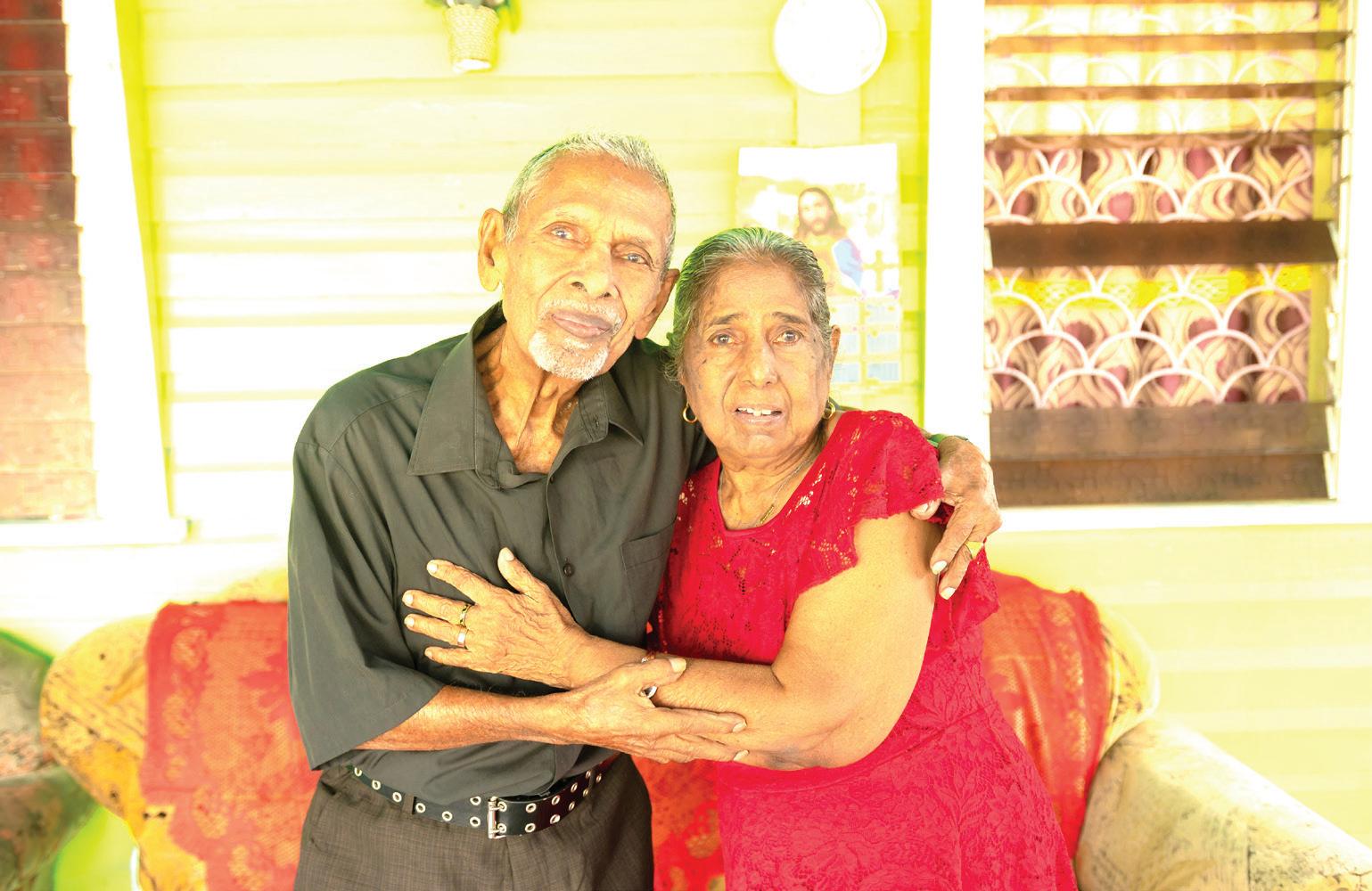
The Haimchandrijisareprobably one of the oldest couples in their home village,and they are fun-loving people who have no serious ailments and do almost everything for themselves.
Vishnudat today would
some time in his favourite spot, on the chair, in the bottom house reading the newspaper daily while his wife Rajmattie would relax in the hammock to wait her turn.
Rajmattie told the Pepperpot Magazine that one of her daughters, who resides in the United States of America (USA), visited Guyana. She had a grand time via a religious function for her 80th birth anniversary celebrations a few years ago and she appreciated that a lot.
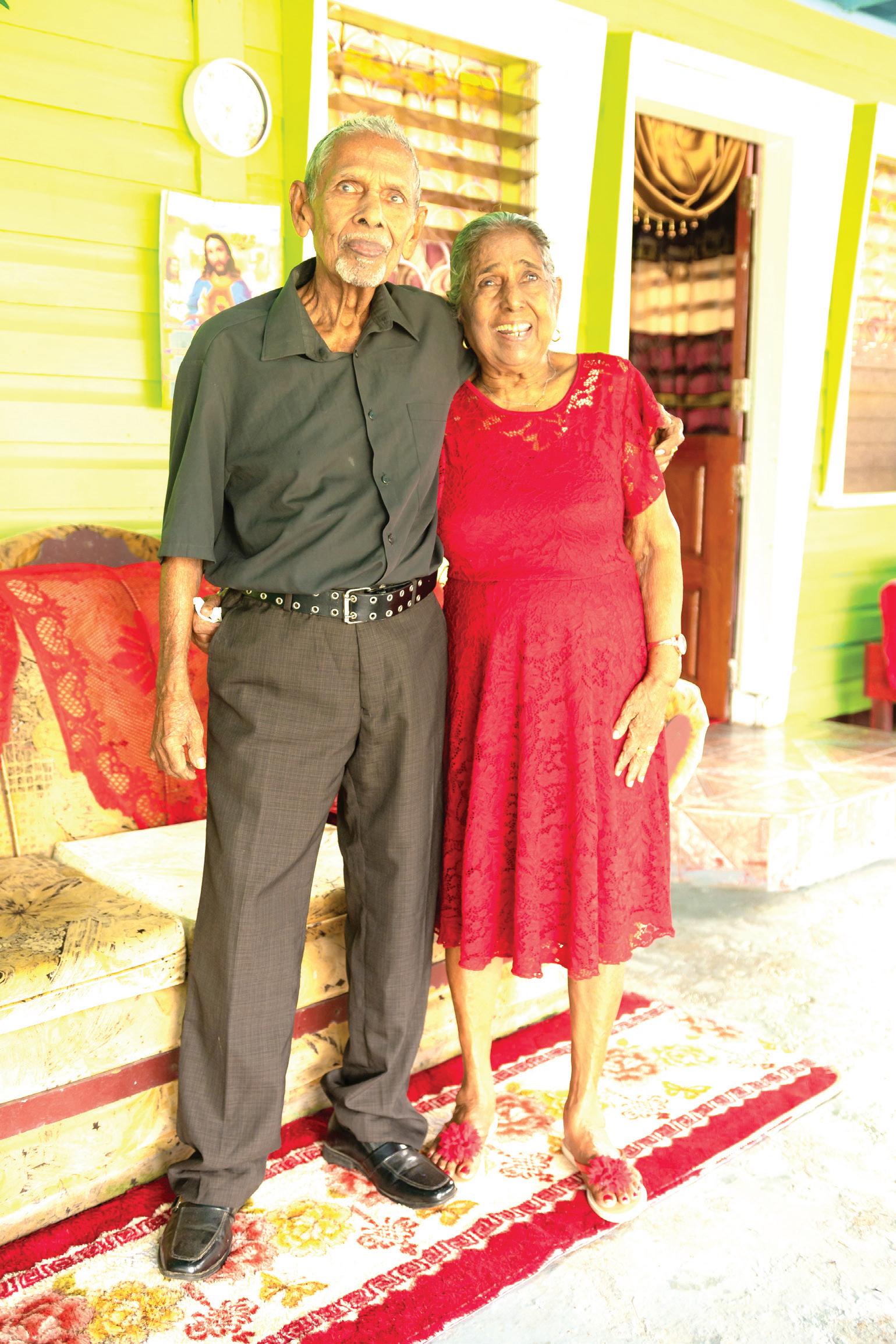
This year, she has no special plans or requests, but whatever her family has in store for her she is thankful because she is surrounded by family members and is
his 40s, but she has seven remaining.
She resides in her large house with some of her grown children and grandchildren, numbering eight in total, and they keep a tidy home and surroundings.
The elder has 27 grandchildren, 31 great-grandchildren and two great-great-grandchildren. She explained that half of her family members reside abroad while the other half lives in Guyana.
Rajmattie stated that she was a full-time housewife and never worked outside of the home but tending to nine children and taking care of general household duties was a tall task.
In her younger days, be-
Rajmattie recalled that back in the ‘black and white days’, things were hard but there was enough and life was much easier then than now since there wasn’t so much now like before.
She had a small cottage in another part of the village and later, she bought a plot of land in the same community and constructed a bigger house, the same one she resides in to date.

prepare himself for leisure of awaiting the newspaper vendor, who would bring his daily newspaper to his home after breakfast.
Then he would spend
never alone nor in want for company.
Rajmattie revealed that one of her nine children passed away, a few years ago, he was ill and was in
fore marriage, she did sewing and was a seamstress for a little while and is originally from Albion and moved to Reliance Abandon when she tied the knot.
The senior citizen reported that she enjoyed cooking and mastered the art of local cuisine and their Sunday lunch was a big thing back in the days when her children were younger.
Rajmattie added that in those days, they enjoyed the simpler things in life and the Sunday meal consisted of dhal, rice, bunjal shrimp, coconut chutney, mango achar, cholonjie, calaloo and fried fish.
Today, she would condemn the cooking done by her children because she is very good in the kitchen and all her meals were a hit including shine rice and chicken curry.
There isn’t much to do
these days except enjoy her old age since all the household duties are done by her children and grandchildren.
Still at her age, Rajmattie is the boss of the home and she takes control as she did when she was younger of the finances and she ensures there is no excess spending.
The elder would read the newspapers and watch television without wearing any spectacles since she is blessed with good eye sight and is very fussy about her husband whom she adores.
“Respect is what made my marriage lasts so long, I took charge of the money and my husband worked hard to provide for us, and no matter what,we have respect for each other and today it is no different,” she said.
Vishnudat HaimchandraijiMeanwhile, Vishnudat, a well-dressed person told the Pepperpot Magazine that he takes pride in his appearance and to date, he would ensure his clothes are ironed and clean.
The 87-year-old worked at the nearby Rose Hall Sugar Estate for 47 years before he retired and was the contractor who built bridges and sluices for the estate.
Some of the bridges he constructed are still operating in the canfields and at the estate.
He reminisced that in his younger days, he was an excellent builder and worked hard for many years, often barefooted and walking for miles in bad weather conditions.
These days, Vishnudat is basking in his golden years as a pensioner and has the time to enjoy life and do simple things like going for his pension and going to the shop to buy things.
He said he has a lot of time now to eat on repeat a few times per day and would watch movies after reading the daily newspaper.
Vishnudat added that life is much more rewarding when you have the support of family and people that supports you in every way and today he is very happy how things turned out for himself and family.
 By Michel Outridge
By Michel Outridge
IT was with a bit of encouragement and persuasion from her Professor MarlynRamjeetthat caused Alicia Guirolamach to enroll for a scholarship to Cuba and become a general physiciannow serving her community.
Now a licensed medical practitioner, Dr. Alicia Guirolamach, who came from humble beginnings is still a humble person despite her success.
She is from a single-parent family of a sibling, a younger brother and her mother. Since her father was never in the picture, she went to school like many others and was the first to attend the University of Guyana, Tain Campus, Berbice.
Dr. Guirolamach told the Pepperpot Magazine that it wasn’t her intention to become a doctor but after her professor advised her she started to see the possibilities.
She explained that one day it all went down after Professor Ramjeet asked the entire class what their career choices were and if they were planning to further their studies and she was unsure and was the only student who did not raise her hand.
As such, Professor Ramjeet asked her to remain after class was dismissed and she encouraged her to apply for a scholarship to Cuba to study and she even filled out the application and that was the start of her medical journey in a foreign country for six years.
The 34-year-old stated that the journey taught her a lot and she is happy she could experience a different culture and became fluent in Spanish despite the language barrier at first.
“It was not easy being away from home, family, in a new country and everything was different but I never gave up despite being challenged and at one point I thought I wasn’t going to be successful,” she said.
Dr. Guirolamach told the Pepperpot Magazine that the food was difficult to consume at first and she had a hard time with the language too.

However, she returned to Guyana a doctor and with a Spanish husband. She is the mother of three boys, a sixyear-old, an 18-month old and a one-month-old.
She revealed that two years after she came back to Guyana following her studies, she got married and settled in her home village of Adelphi Settlement, East Canje, Berbice.
 Dr. Alicia Guirolamach (Delano Williams photos)
Dr. Alicia Guirolamach (Delano Williams photos)
When the team caught up with her, she was at her mother’s place, a common occurrence and she was relaxing with family members, being on maternity leave.
Dr. Guirolamach is attached to the New Amsterdam Public Hospital and spent several months at Suddie Hospital before being posted to New Amsterdam, Berbice, in 2014.
“I like what I do for a living more so I like the fact I can help people and I have an open-door policy where anybody can come here and I wouldn’t charge a cent for medical services,” she said.
Dr. Guirolamach pointed out that being a doctor for her isn’t about making money but it is all about giving back to society and it feels good to be of service and the respect she has gained has
really warmed her over.
“If you become a doctor to become rich quick you will be sorely disappointed because that is no way to life. Being a doctor is all about the serving people, the community and it beings me real joy giving my services for free,” she explained.
Dr. Guirolamach noted that she would like to study internal medicine, but that is a field that would require her to be away from home and her family for some time and with small children, she is not willing to do that just yet.
She is, however, exploring other options and giving up isn’t part of her agenda as a person and career-driven individual.
Dr. Guirolamach disclosed that she did not limit herself and believed in herself and that is why she is successful even when people told hershes wasn’t going to amount to anything.
“Being humble and normal is key to a good life and as a doctor one success lies with their character and what they do to make a difference in the lives of others, the impact is what matters,” she said.
joiners.
I can safely say I can do it well,” he said.
SUNILDAT Ravi Haimchandriji,better known as
“Spoon”,isa gifted furniture maker (joiner). It is a skill that runs among the men in the family.
Haimchandriji can build anything from scratch and according to specifications. He is well versed in home furnishings because he has been directly engrossed in the profession for the past
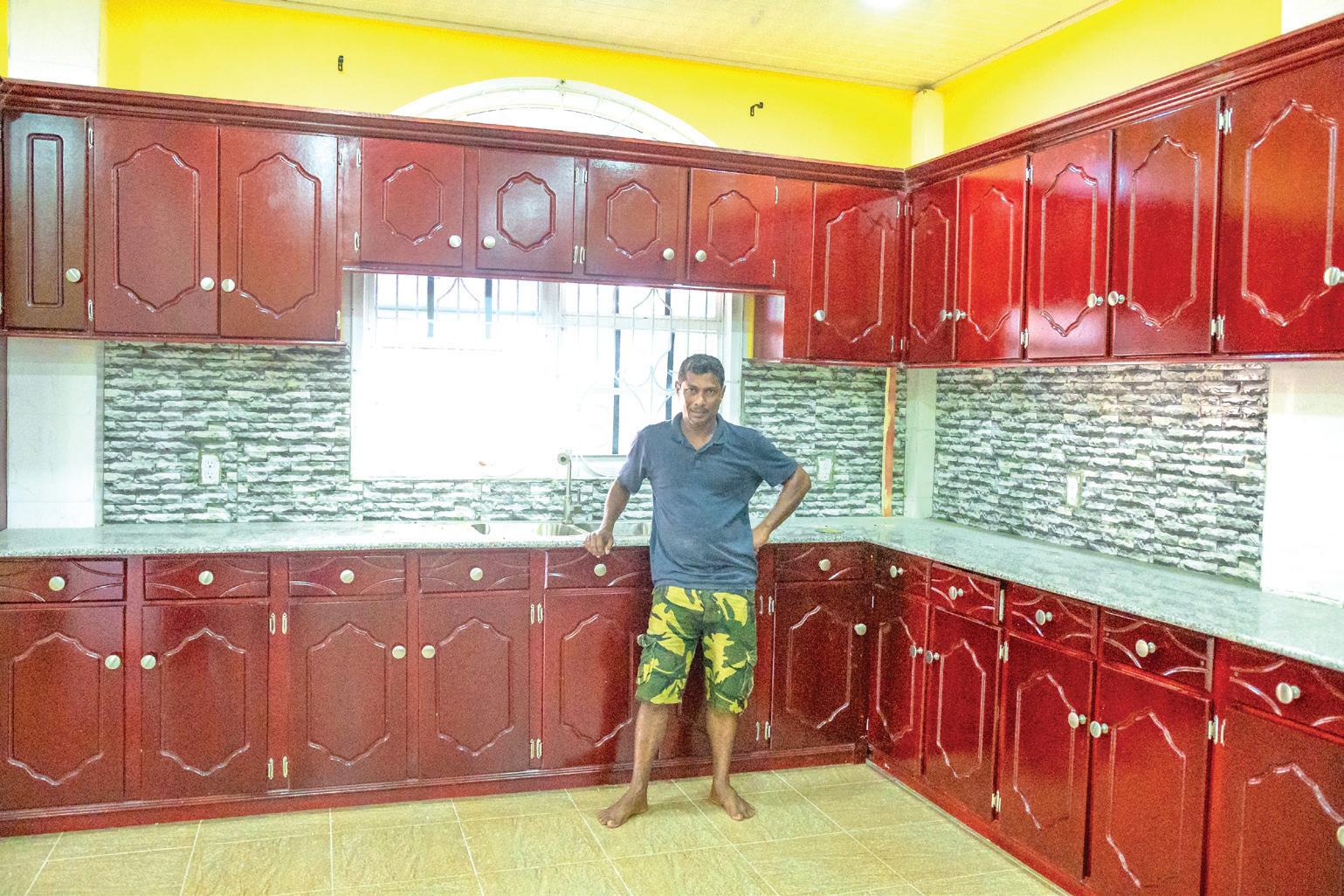
Haimchandriji told the Pepperpot Magazine that he exited the formal school system at 14 years old and began working as a joiner.
He used to work with
a customer comes with a photo of what piece of furniture they want, he would advise them and try to give them exactly what they require without delays.

Haimchandriji stated that he used to be an employee at
Haimchandriji related that furniture lasts on based on how you take care of it and the type of woods used and the best quality of woods for home furnishings are silverballi and keriti and the MDF waterproof
shop since most people prefer he goes to their houses to do the job and often provides the materials.
He is a resident of Reliance Abandon Village, East Canje Berbice.
The furniture brothers of Adelphi Settlement Parmanand and Kishore Persaud, who are brothers, also share skills n the furniture business. Parmanand is a joiner who specialises in spindles and bed legs, whileKishore is versed in all types of upholstery work.
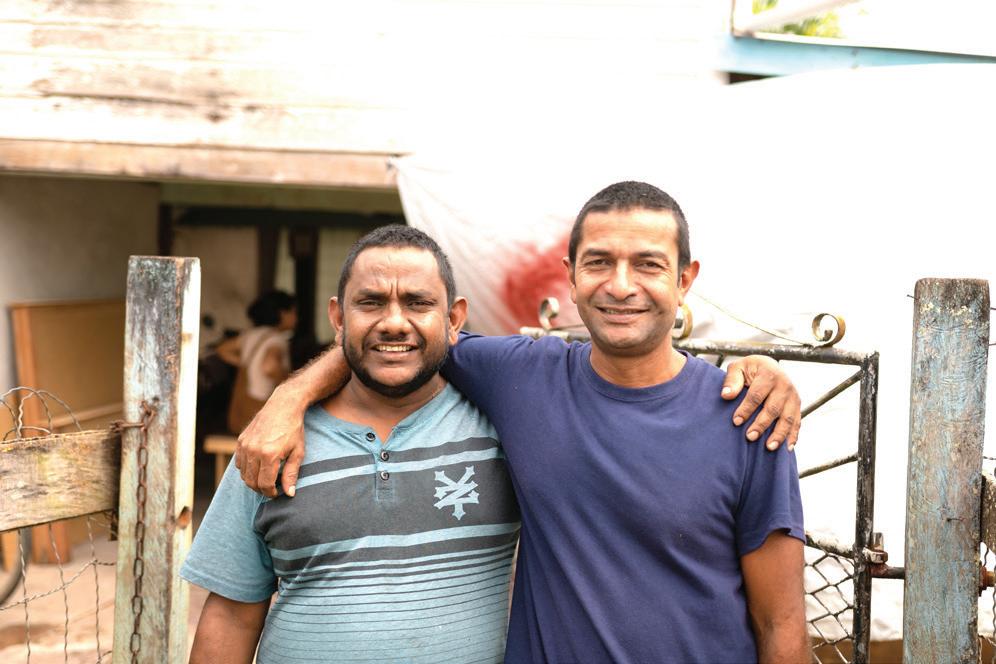
Parmanand told the Pepperpot Magazine that it is a generational tradition, most men in the family are joiners and it is a natural gift they inherited.
His grandfather and brothers are also joiners, so they made it into their jobs and are hoping to extend their small business into a stationary workshop.
It is very clear that he likes his job a lot because when he speaks of the pieces he has made, his features would light up and he credits his ingenuity tobeing different which allows him to make pieces unlike regular
44 years.
“I was drawn to this type of work since I was a boy because my father as a builder and my brother is also the same, so I took an interest early on and I tried to master the skills required and today
people and then he branched off to become self-employed and he always knew he would be good at his job because he was way better than others and his very first piece was a slide glass cabinet.
The joiner reported that if
Home Line Store, the maker of all household furniture, many years ago.
The 55-year-old father of two recently outfitted a newly built house with all the fur-
wood.
The joiner stated that he works mostly alone and when he has a job that requires more than one person he employs two men from the
He would do the furniture job part-time since he is employed at the Albion Sugar Estate as a Bell Loader and works on a shift system for 12 hours at a time.
Kishore is a full-time furniture maker and when the team visited, he was making a bed at his home which serves as a temporary workshop.
Kishore told the Pepperpot Magazine that he would make furniture from scratch and re-cover chairs among other household furniture.
The father of one stated that he is aiming to build a workshop at his home and he is of hopes he can achieve that this year.
Kishore added that he is presently employed at a furniture workshop and would take on jobs at his home.
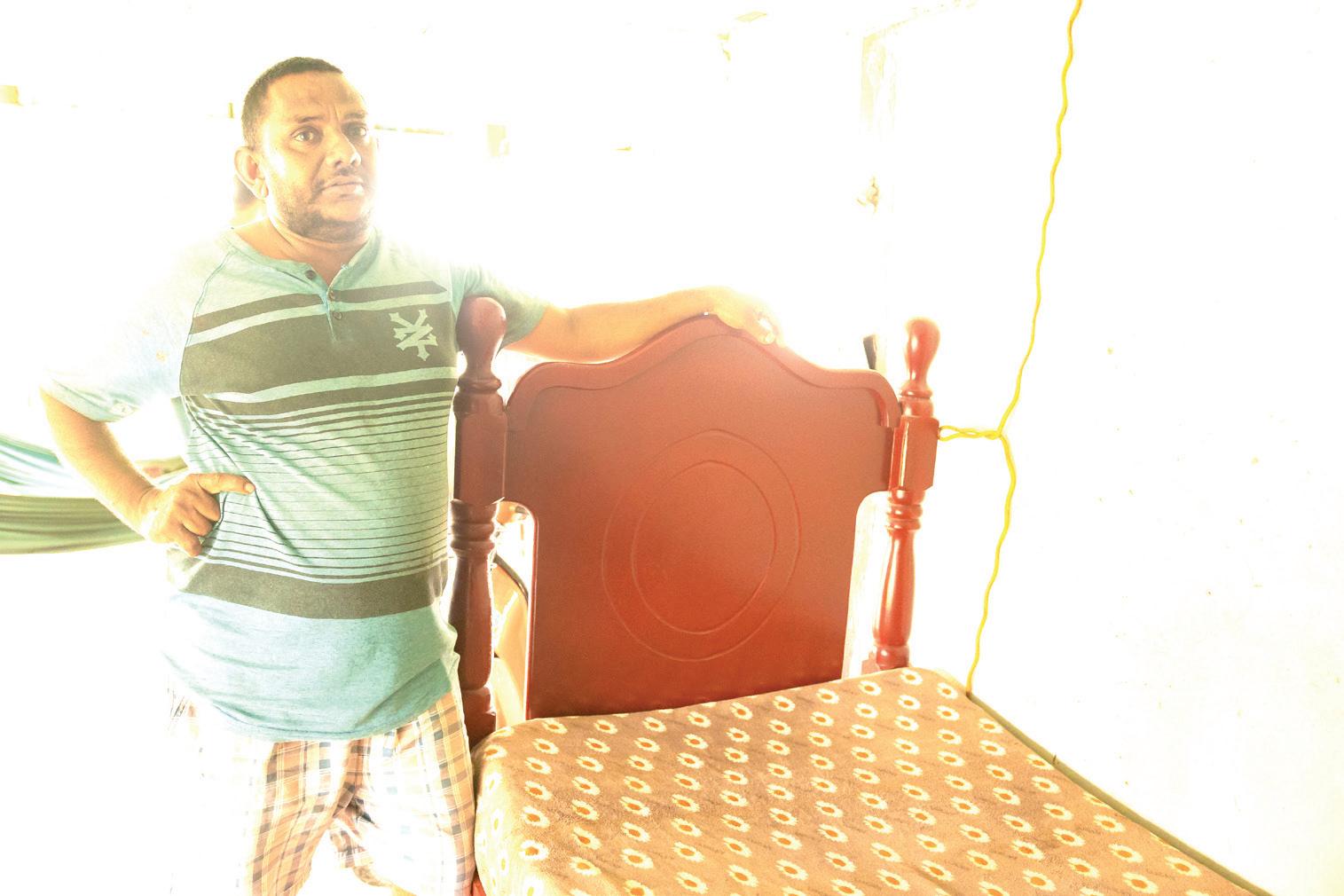
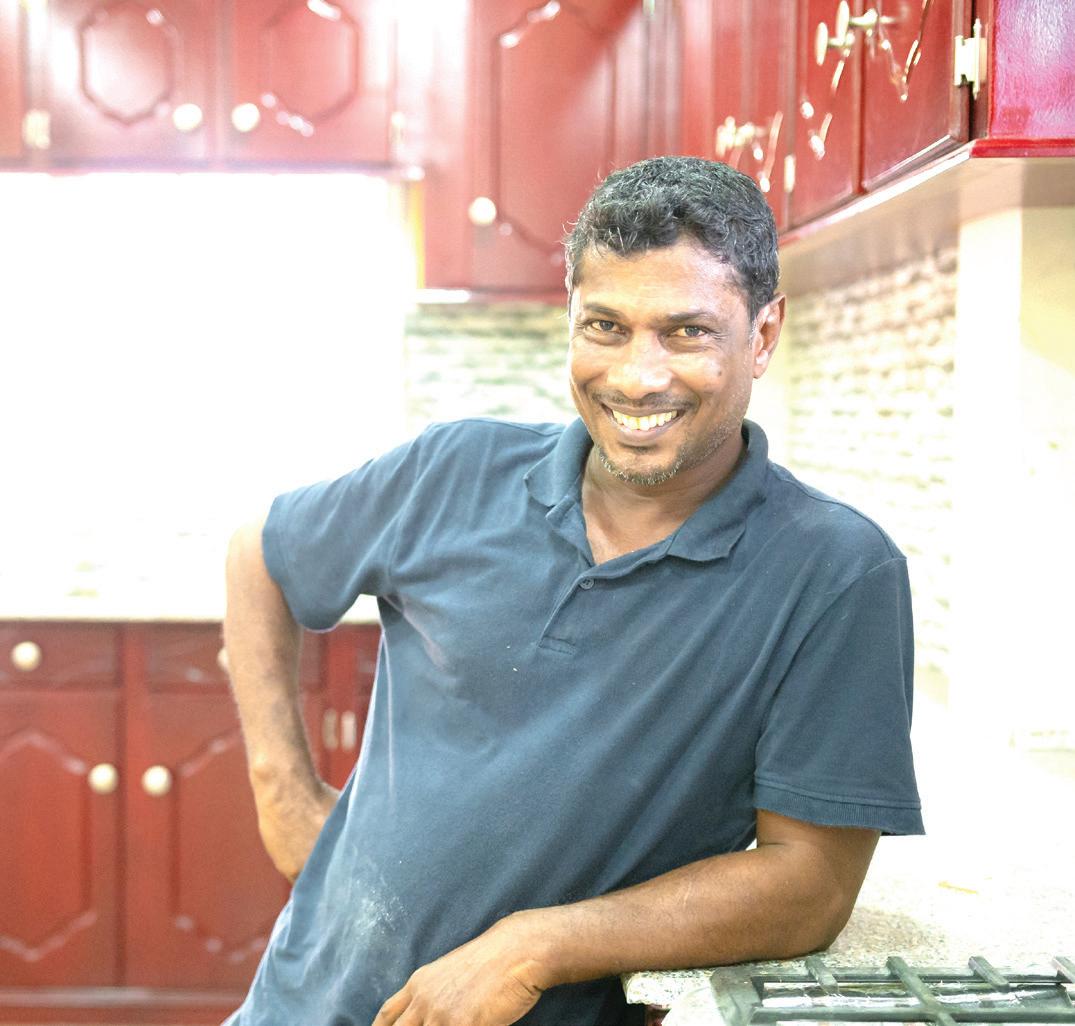
nishings and employed two helpers to sand and spray the pieces, including cupboards, counter tops and general furniture.
He added that pleasing the customers is what he is all about because people have to get value for money and giving a good, quality product is an excellent policy for small business, it keeps it operational.
“I like to challenge myself to go over and beyond and I would always try newer pieces and get creative and make furniture that is very pleasing to the eyes and of an excellent quality,” he said.
village to assist.

Haimchandriji disclosed that he doesn’t have a work-
“To have a comfortable life, you have to have two jobs and it is hard but you must put your family first,” he said.
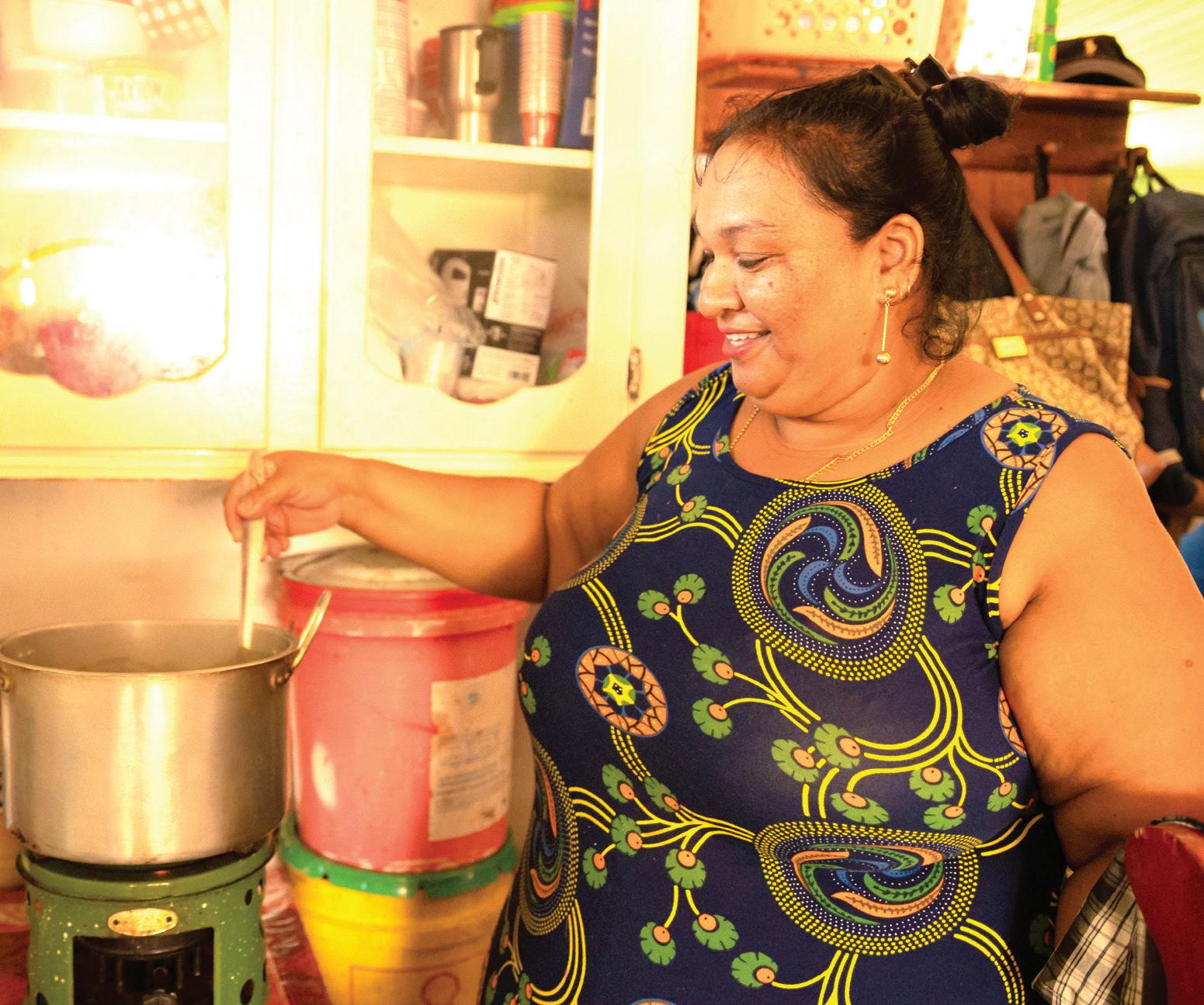 By Michel Outridge
By Michel Outridge
SHALINI Devi is very good at what she does and she is well sought after when it comes to preparing delicious foods for functions including weddings, birthdays and ‘jhandis’.
The 40-year-old can cook just about anything and her foods are very sumptuous so much so people would hire her to cook for them whenever they have a function.
Devi is well-known in her village of Adelphi Village, East Canje Berbice, because of her cooking and as a local of the community.
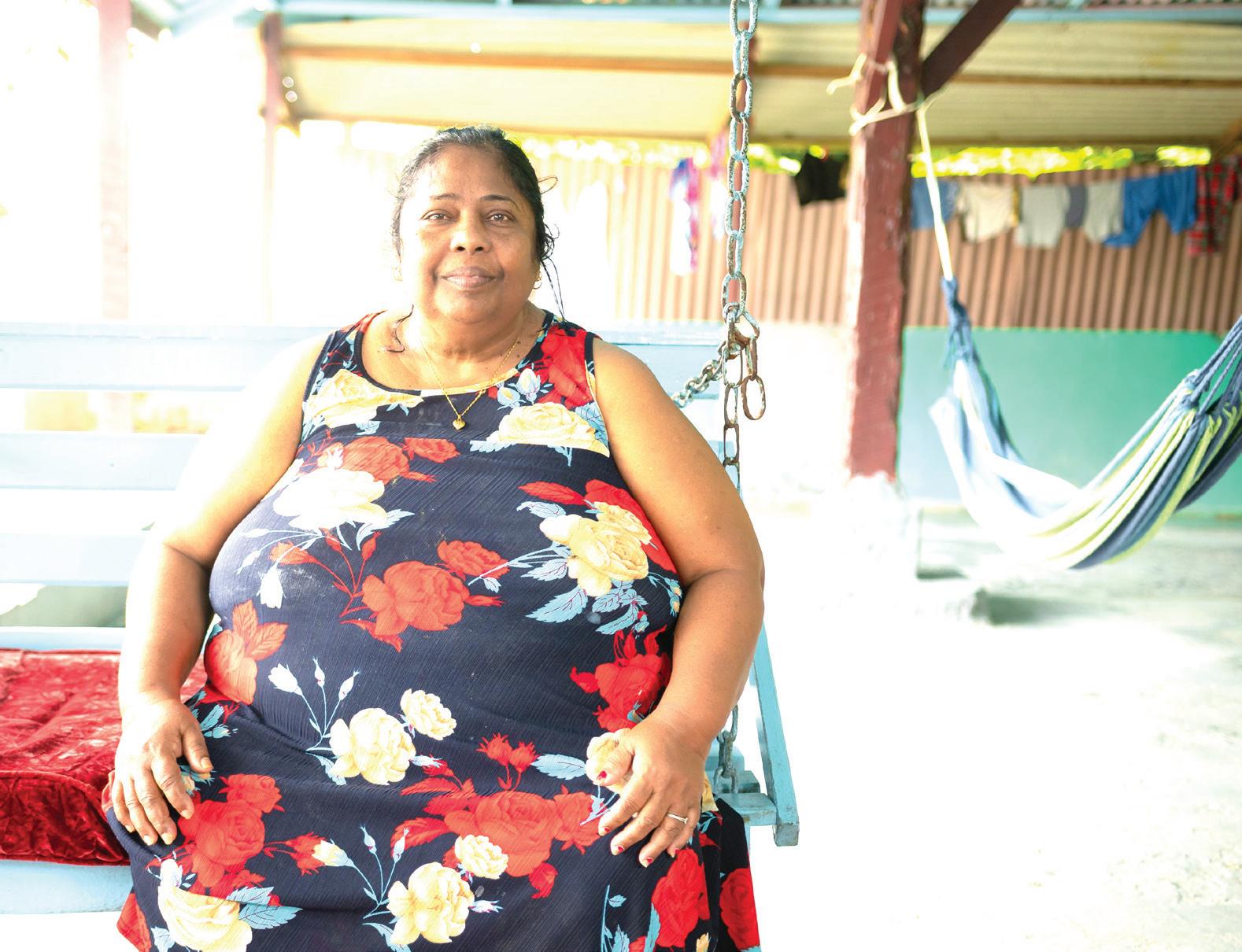
The mother of three is a part-time homemaker employed by a relative and whenever she has to cater for an event, she would be on her feet from morning until all the foods are prepared from scratch, then she would be able to go home after a long day of cooking by the open fireside.
Devi told the Pepperpot Magazine that she specialis-
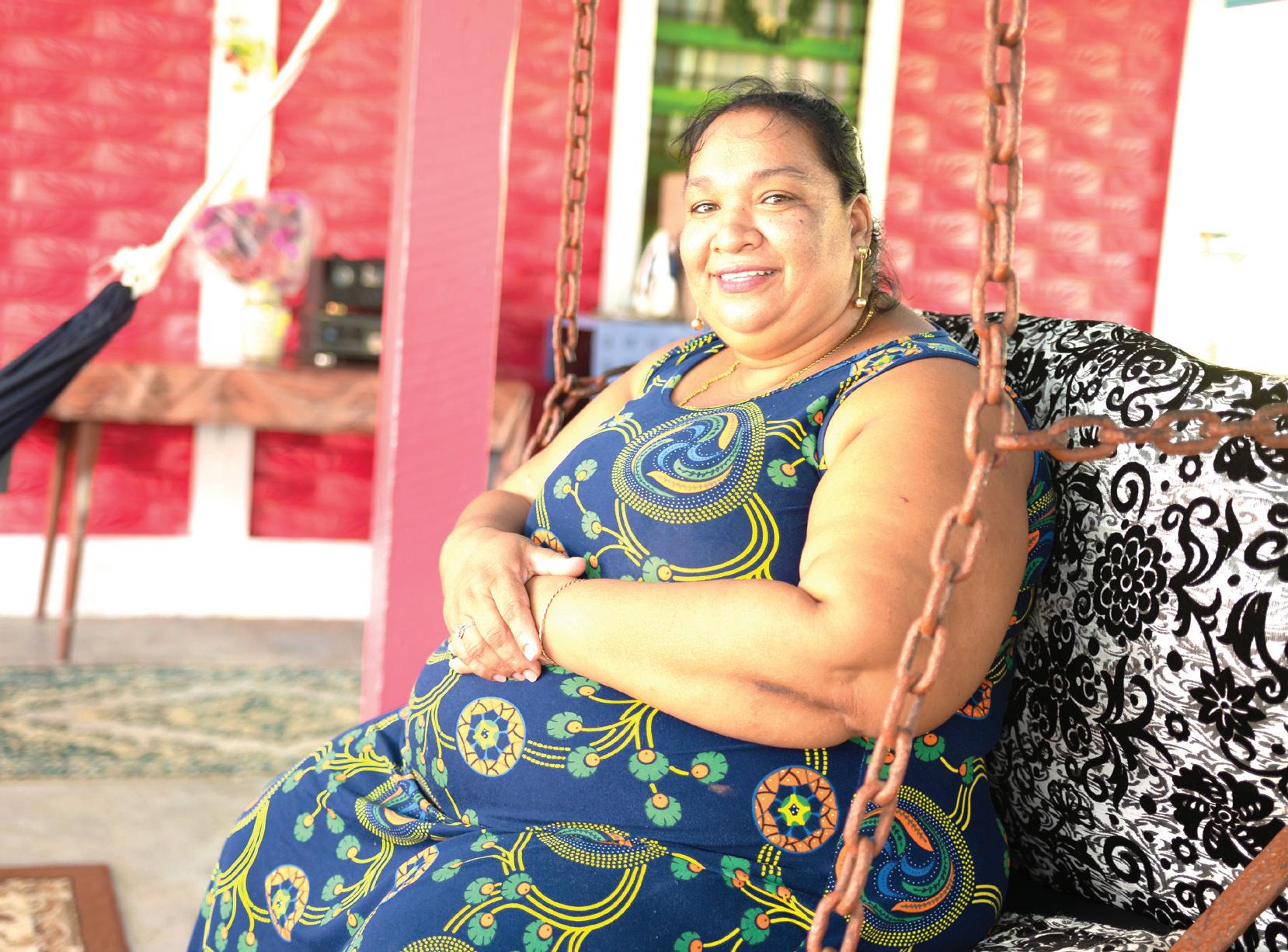
es in all local cuisine and can make it in large quantities and recently, she catered for 500 people at a wedding.
“I can do quantity and quality and do it for a reasonable fee for the day but some people are paying a mere $5000 for the entire day, which is too small for a whole day of work,” she said.
Devi also makes good curries be it seven curry or meats, and would be asked to do all the cooking at functions for the family and the community.
She is also a homemaker, taking pride in her surroundings and spending time caring for her plants, and cooking for her home.
Phulmattie Haimchandriji
Meanwhile, Phulmattie “Dolly’ Haimchandriji is also an excellent cook and she would be hired for many functions in and around the village.
She related that she scaled down in terms of going out to cook at functions
these days due to ill health.
“Because of years of being in the heat and then using cold water during cooking by the open fireside, it caused me to develop a wheezing and I does get shortness of breath,” she explained.
Haimchandriji would use her time to stay in and prepare meals for her household including her elderly parents, relatives and brothers.
She reported that Reliance Abandon Village, East Canje Berbice, is a quiet countryside village with four internal streets which was recently upgraded to cement.
Haimchandriji stated that before the street was upgraded, it was filled with huge potholes and was in a bad state.
She is pleased that they benefitted from upgraded
streets and says they are not prone to flooding and generally it is a good place to reside.
Reliance Abandon Village has electricity, landline phones, internet, potable water supply and they have access to health centres and other facilities.
The Post Office is nearby and easily accessible and they have a few shops where much-needed items can be sourced.
Bulk shopping is done at New Amsterdam and almost everything is within reach in that village.
The Rose Hall Sugar Estate is nearby and they have a police station, the Magistrate Court and the health centre a stone’s throw away.
Haimchandriji told the Pepperpot Magazine that most people in the small village are related through marriage and blood.
She stated that it is a safe
place to live. There aren’t bandits there except for the few kitchen thieves and the people are very neighbourly and kind to each other, making it a close-knit community.
Haimchandriji added that most people migrated while some died and there are a few newcomers but other than that there are no unfamiliar faces in Reliance Abandon.

interesting professional evidence given, yet the judge’s comments were baffling.
There was an incident that happened at Bar and James Street Albouystown years ago that I almost witnessed, which defines the cultural chasm, that with males growing up in Creole Culture, the violation of manhood has to be

ritually responded to,with extreme prejudice, whether judged wrong or right, the same applies in the defense of women folk. What is deformed in the shades of our culture in contrast to the laws that govern us is the cultural knowledge chasm; the ‘Will’ to address where the true guilt rests.
I watched, with amazement, on my wife’s phone as a naked manmade his way into his neighbours’residence, with the occupant’s home invasion and obvious cooperation in respect to his intent expected to be a non-issue. I watched as the police lifted him out of the building and could not help but wonder, had any writer of fiction started a novel with a scene like this they would have had to have a strong supporting chapter to define this action and to have a following script rooted in both medical science and mysticism to convince the roaming imagination of readers to remain loyal to whatever the expression was, be it novel, graphic novel, or movie.
The difference is this was real and not foreign news but ours.However, I had my interpretations of what may have happened. I did inquire from friends out there, “All dem things could happen nowadays, banna using Molly and all kinda pills and drugs, we time was different.” Was it? I asked myself. We have always been a society with a “look the other way” tendencyvoid of the use of intellectto social

problems that were different in a deadly way.
I remember an age group person I knew well. He was nicknamed ‘Sexy’ based on how he conducted his engagements (he can be called a serial rapist, was at one time charged for over a dozen such acts). After the act, he then turned up carryingchocolate to the victim.The police were looking for him and when I had a conversation about his approach to courtship. He honestly couldn’t understand what he did wrong. The police took the primitive illegal path and executed him with multiple shots. If a relative of one of his victims had done that, I would have understood, but not Law enforcement. With all those bright judges and lawyers, doctors, etc.That could have contributed to a more sensible method of handling this contradiction of normalcy; how come no one thought of exploring the deformed shadows that emanated from ‘Sexy’ and learning to identify and understand its content before it matured?
I had a conversation recently on the differences, more like our parallel cultures that exist, almost invisible to each other, except
for stereotypical assumptions. When it comes to some grey areas with certain incidents, they eventually reach the courts. The courts are populated in the majority by citizens that have evolved from comfortable upbringings, and nothing is wrong with that because that’s what every child should be allowed to benefit from. In many cases, if a child from that home seeks a tainted adventure that goes wrong, influences automatically in most cases, will intercept and cushion the outcome. This is not to say that things don’t go wrong in those privileged homes that can also be damaging in other ways to children and society at large eventually. On the other side, however, poverty has been relatively a majority condition for most of the population. Poverty is not only in missed meals, a missing parent, and a lack of close social empathy but an open gate alternative of nightmare options, dressed up as machismo that is fueled by desperation into acceptance; in comparison to being subjected to the social impositions of inferiority complexes, also rites of preservation.
Thus, when applied to the courts, the prisons swell while nothing changes. The fact is, that the command helm of the court, should be guided by what is lacking, a competent corps to package cultural rites, responsibilities, and loyalties to conditions beyond the working value system of who sits at the command helm of the court, guiding how best to create policy bridges, instead of further chasms. Two references can be used as a guide, one I have used before.
‘Flashback’ to a youth whose mother had begged pushers not to sell her son Marijuana, because it affected him negatively, (this was not the first mother who had done so) but they ignored her as they do, and he stabbed a male whom he had accused of trying to rape him, that was in 2015. In 2018, this same youth was sentenced to 23 years in prison; one wonders how did the judge arrive at this extreme verdict, against the evidence published? Second, a drug addict in 2013 was sentenced to 16 years for killing a man whom he accused of repeatedly indecently assaulting him when he was stoned, there was

THAT night after a leisurely, relaxing bath and early dinner, Sarah began reading Aryan’s book of poems. His work was impressive, intense, and deep, coming from such a young mind, with words that expressed feelings of yearning, tangible and real. She closed the book and sat for a long time thinking.
She still wasn’t sure Aryan should know the truth, but he was a smart boy and one day he may find out on his own. She took a deep breath and said to herself, “I will take this one careful step at a time.”
She hadn’t been home since her baby’s birth when she was sent far away. The stranger, a businesswoman,
had taken her along the Essequibo River to Bartica. She owned a restaurant and Sarah was put to work just two days later in the kitchen and given a small space to sleep. But she could hardly eat or sleep and soon fell ill. The lady didn’t pay close heed to her but after her condition worsened, she took her to the hospital. A few days later,
a social worker visited her after an alert nurse had made a report. When contacted, the woman told a convincing lie to save herself and Sarah was taken to a shelter.
That place had felt like a haven, where she had learned a few basic skills of cooking and craft, and she read books from the library to improve her knowledge. Six months later some Christian missionaries from the United Kingdom visited. It was the first time she had felt comfortable opening up and telling the story of her ordeals. It touched their hearts deeply and one middle-aged woman who had a school in the interior decided to give her a
mates under the pretext of being charitable workers. Not knowing who was living there and what the situation was, she had to take that caution. She hardly had any fond memories of home and often wondered about her two brothers and sister.
The old wooden house had been replaced by a new flat concrete house.
“Oh, they seem to have done well over the years,” she mused, “But I wonder where that kind of money came from,” sheremarked disdainfully.
No one was home except for a retired caregiver who was there to take care of the mother.
She got up to leave and her mother called faintly, “Reshma.”

Sarah turned around and saw tears streaming down her mother’s face, “Ah been waiting fuh de day when as coulda see yuh again and tell yuh sorry fuh all de suffering ah cause yuh.”
That was when Sarah felt a dormant emotion awaken within her and she smiled and nodded a little, “Reshma forgives you.”

This was a woman who did not deserve to be forgiven but at the end of the day, she was still a mother who could have recognized her child. It was now one of the dark memories Sarah could erase from her mind and she exhaled in relief as she left the house.
“Where to now?” her friends asked.
“A top-class restaurant in the city.”

The restaurant was one of several business entities owned by Mrs. Malhotra, her ex-mistress.
home, a new life, and a name.
For Sarah, it was like a Godly intervention.
The torn petals of a poor, sad young girl’s life weresteadily blown away by a sharp gust of wind and she grew and bloomed as Sarah.
The time was now right to face the living demons of her past, so the dark memories could be obliterated from her mind.
A few days off were extended to all the teams before they returned to the military base and Sarah used that opportunity whilst awaiting approval on a week’s leave. She first visited her old home with two of her closest batch-
She had apparently suffered a stroke a few years ago.
As Sarah looked at her, she could feel no pity for the woman who had chosen money over her daughter. Nevertheless, she spoke with her for a while, maintaining her cover and not wanting her to know who she was.
After a long pause, the mother said …, “Ah praying f-fuh meh sins.”
“What sins?”
“Wah m-meh do meh big daughta.”
Sarah smiled wryly and said nothing, satisfied to hear that she had realized her wrongs.
The place was almost filled but they managed to get a table in a corner with a garden backdrop of colourful bougainvillaea. It was a nice place with rustic décor, tones of brown, gold, and copper, soft music, and warm lights. As they waited on a server to take their orders, Sarah glanced around, recognizing a few ladies who sometimes attended socials at the house. Mrs. Malhotra herself wasn’t there but halfway through lunch, she walked in, still as beautiful, with an air of sophistication. Sarah glanced her way once or twice as she spoke with a few diners, andas Sarah and her friends were looking at the dessert menu a familiar voice said, “Hello, ladies.”
“Hi,” they responded at her engaging smile but when she looked at Sarah, her face turned a little pale. She recovered quickly and said, “Just want to welcome you to my restaurant and hope you had an enjoyable meal.”
“We did, thank you.”
She turned to move on,
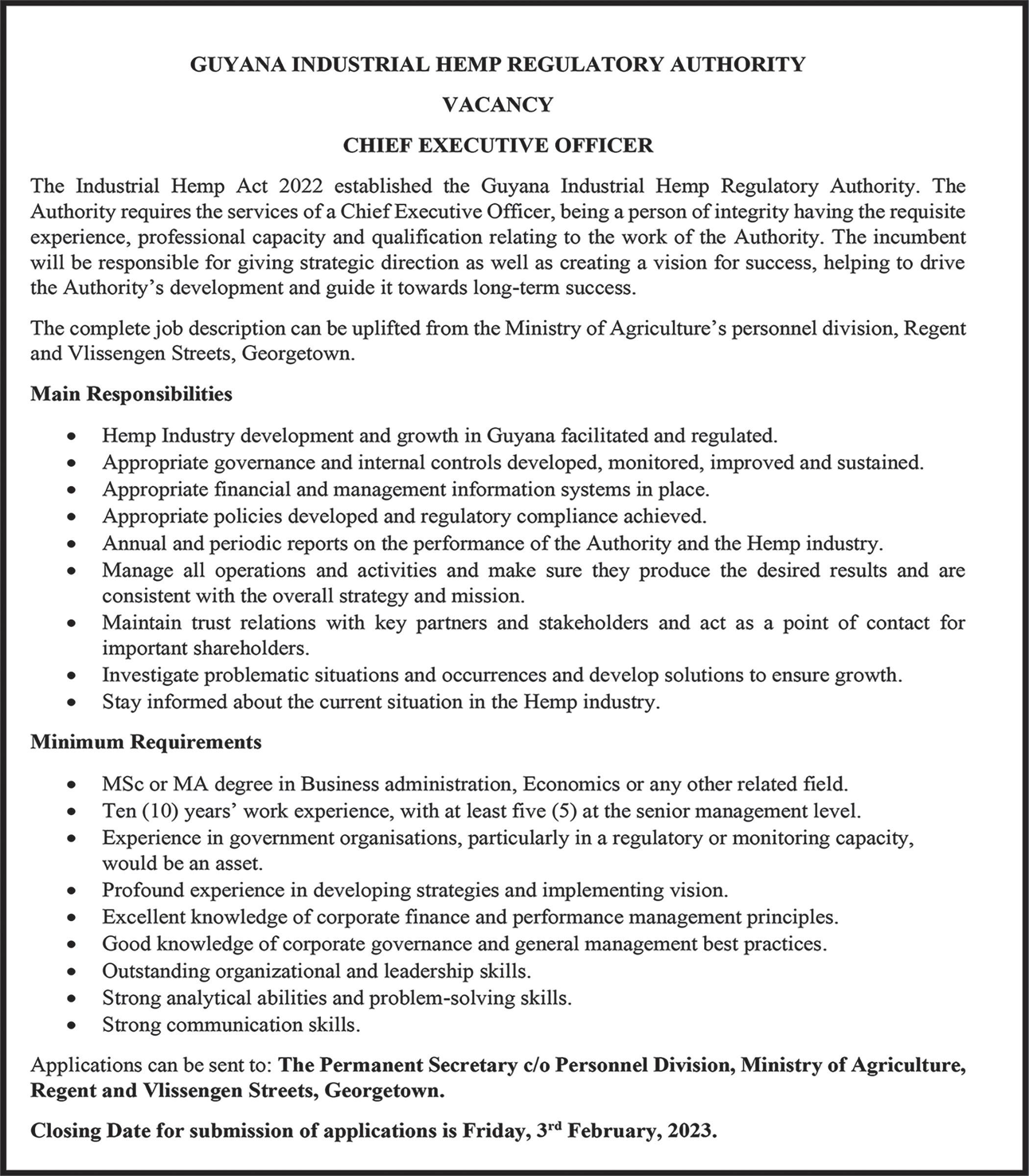
THE digital age has never been more advanced than ever over the last decade or so. I might not be an expert on social media and marketing. Nonetheless, I am a young Guyanese who frequently uses the Internet. I have seen firsthand how social media has transformed our tourism industry. During the COVID-19 pandemic, we were all forced to switch to digital platforms. I think that was a blessing in disguise. At the time, we probably didn’t know this, but I’m glad that many of us used the technology at hand. I’ve seen how social media tourism pages in Guyana made use of this opportunity. Apart from this, many young influencers, travel enthusiasts, and adventurers used social media and other digital platforms to promote and encourage tourism in Guyana. In essence, social media allowed us to share aspects of our life, culture, geographical landscapes, landmarks, and other key areas of interest within our country.
Social media allowed us to create an open catalogue and platform for the rest of the world to view who we are, where we live, and how we live. The world is finally getting
social media. While these platforms are available, it should be noted that the quality of content is just as important as the platform itself. While the world is advancing with technology, there’s still so much for us, to learn here in Guyana.


My youth column has always been a platform that opens discussions and dialogue for the perspectives of young people in our country. I am confident that this perspective is also one that is held by many other young Guyanese. Simple things such as hotel reviews, a video experience at a local restaurant, or a social media guide/list of the most visited places in Guyana can boost our tourism industry in unimaginable ways. Social media as we know

it, allows us to create content and share it with the rest of the world to see. How many of us have looked at reels or pictures and dreamed of seeing that exact location in real life? Do you know how many people will add Kaietuer falls, the Iwokrama Canopy Walkway, or the St. George’s Cathedral to their wishlist if only we give them a glimpse of their beauty and history? Digitally, I’d like to encourage you all to help extend our country’s reach on the global map. A like, share, or comment can go a long way for our local creators as well. We have all that we need at our disposal, it’s just a matter of utilising it effectively.
to know our name on multiple media platforms, mainly because of the Internet. By now, I’m sure many of you are aware of the various tourism websites, social media, pages, and blogs/blogs that are available with Guyanese tourism content. The idea for this article came about after viewing an Instagram reel video with a foreigner who recently visited our country. The video was short but yet still, it captured the beauty and essence of our country perfectly within 10 seconds. That 10-second video encouraged so many people in the comments from various countries worldwide to visit Guyana––a country many probably didn’t even know of prior to watching the video. It blew my mind. The video had approximately 100,000 views alone. This is just one of many other examples I’ve encountered on my personal
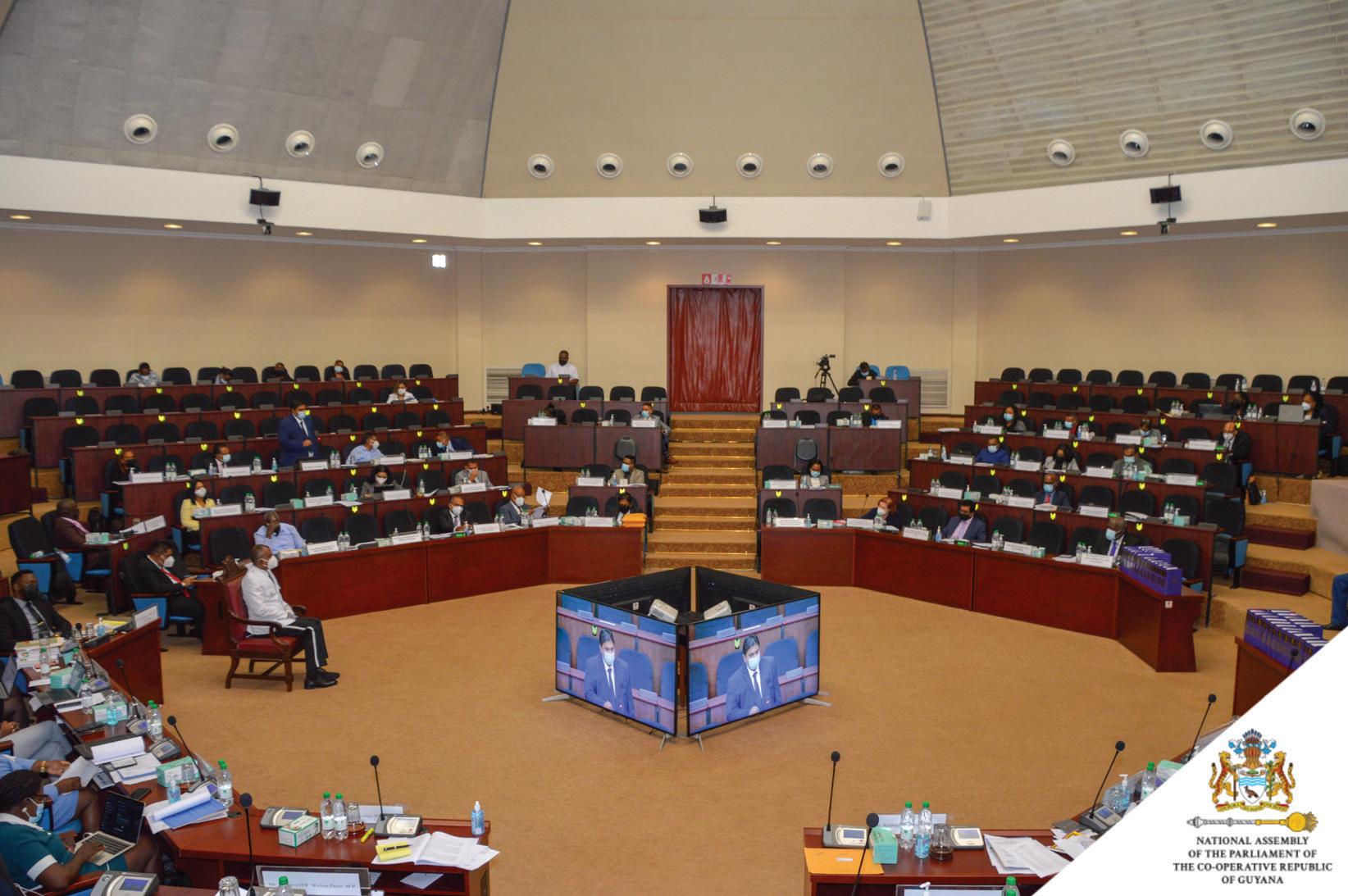
THE Guyana Consumers Association (GCA) has not commented on Budget presentations over the years because there is always a plethora of comments in the media and, more importantly, because any comment, no matter how objective, is always treated as being tainted with the adversarial politics of the country and the Guyana Consumers Association, by its Constitution, must never be involved in politics. This year, however, is the first time that there has been a substantial draw down from the Natural Resources Fund and that carbon credits have been used in the Budget and marks the beginning

of a new era in the Economic and Social History of Guyana and this justifies the GCA making a comment this year. Our comment will,however be confined to the Social Allocations of the Budget since such affect consumers in a
more direct way.
Before doing so, we would like to remind our readers that there have been two schools of thought about how oil revenues should be spent. The first, who are largely academics, feel that the easiest, most transparent, and quickest way to eliminate the scourge of poverty is to make large direct cash transfers of at least $ 1 million to every citizen, equivalent to several million per family. The other school, which consists of most politicians and business folk and whose position is similar to the opinion in most Oil Producing countries today, advocates that part of the Oil Revenues be kept in a Fund for the benefit of future generations and the other part spent on social and economic development. This Budget reflects the position of the second school and claims that it addresses “the present needs of today and the critical investments needed for tomorrow.”
All sections of a Budget affect all citizens, but in this offering, we shall focus on the social allocations only since such affect consumers directly, and we would wish them to be aware of them so they would be able to take advantage of them:

Salary adjustments to an amount of $3 billion would be made for the Disciplined Forces - the Police and the Army and would affect 14,000 persons and their families. Health Workers who would, including doctors, nurses, medexes, and so on would likewise receive salary adjustments. These adjustments would cost $ 3 billion.
Income Tax relief used to be granted at $75,000per month would now be increased to $85,000. $3.3 billion would be allocated to this.
The ‘because we care’ cash grant used to be $25,000 for every child attending public and private schools, would now be increased to $35,000. Accordingly, if a parent has three children at school, that parent will receive over $100,000. A total of $2.2 billion have been allocated to this grant. No excise tax would be charged for fuel imports, and this would prevent fuel prices from being increased. This facility would cost $17 billion.
SEE PAGE XV
FROM PAGE XIV
Freight charges always form a part of the price at which imported goods are sold. $6 billion have been allocated to reduce such charges and this would result in stabilizing prices at which consumers purchase imported goods.
Thousands of part-time jobs have been created countrywide to relieve unemployment, and $10 billion have been allocated to cover wages.
Old Age pensions have been increased from $28,000 per month to $33,000 with 73,000 persons being beneficiaries. Public Assistance has been increased from $14,000 to $16,000 per month with 29,000 persons benefiting. $4.11 billion have been allocated for this relief.
To purchase or build a home, the citizen would have
to take a mortgage on which he/she must pay interest. Mortgages for low-come houses at lower interest rates were increased from $15 million to $20 million and payment of VAT has been removed from the sale of the residential property thus reducing the cost of home ownership.
Tax relief was granted on the purchase of motor vehicles, both electric and those using fossil fuel, and this will allow more citizens to own cars.
Though allocations for Health which would include items such as upgrading or building new hospitals and health centers, expanding laboratory services, and acquiring modern technology; or Education which would include upgrading schools andbuilding new ones, furthering the GOAL scholarships, free textbooks for primary and secondary schools; or

Housing or Water and Sanitation or Social Services such as the provision of shelters or Sports, are all large and inclusive Social Spending Heads, we will not deal with them in any detail since they are macro and do not affect the consumer with the directness of a salary or Old Age Pension increase. With the spending on specifics as mentioned above, citizens would still be enjoying transfers from the Oil Revenues though not with the directness of Cash Transfers of millions of dollars for each citizen.
As consumer advocates, we would always feel that the increases should have been greater. Nonetheless, we appreciate what has been allocated and look forward to further increases in 12 months when the next Budget would have been tabled.


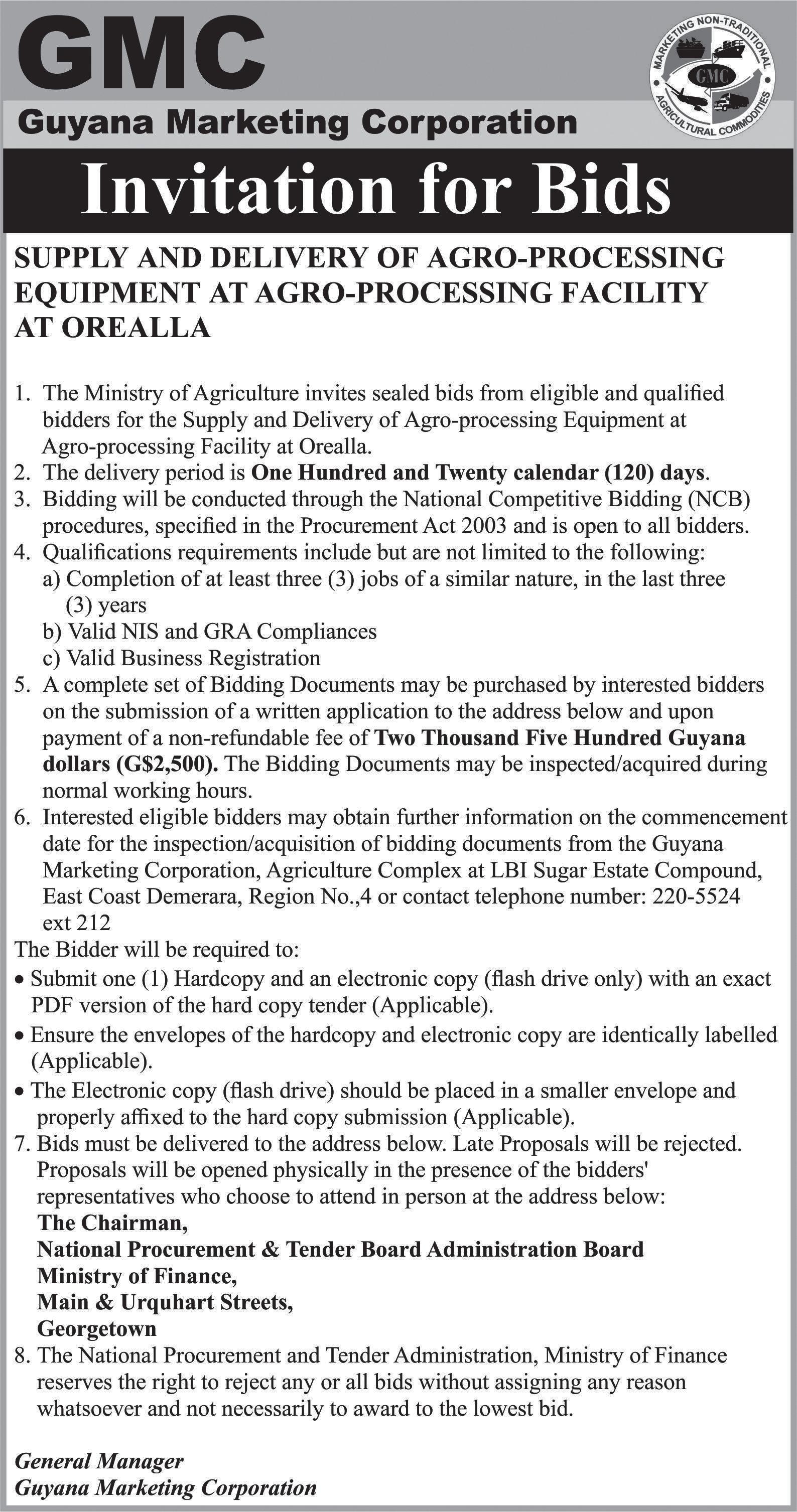

THERE are times when local politics and political representation, more specifically, can be disheartening. Oftentimes, the reminder of how disheartening that representation can be, comes when dozens of political representatives congregate and engage each other. And the past week has been fraught with such reminders.
Last Monday, the 2023 budget debate got underway. This is a standard part of assessing the national spending plan after it is presented by the country’s Finance Minister. And it precedes the consideration of the budget estimates- where the budget will be scrutinised in greater detail. Importantly, it is one of the few times when most, if not all, of our Parliamentarians, get the opportunity to speak on a single broad topic (that is, the budget). So, one would expect robust discourse on programmes, projects, plans and alternatives.

In my recent memory, political debates in our National Assembly have not yielded the type of mature, robust debate that informs policy change (or, at the very least,consideration). And any real debate is overshadowed by the cacophony of problematic heckling.
Last Tuesday, however, there was an interesting and
instructive exchange.
The Speaker of the National Assembly Manzoor Nadir said publicly that people following the live stream of the debate were engaging in race-baiting and other disrespectful discourse. He urged viewers to remain civil, stating that they can interact “without being nasty”.
Immediately after the Speaker’s remarks, Education Minister Priya Manickchand went to the podium to begin her presentation. Instead of diving straight into the defence of her ministry’s massive $94.4 billion allocation in the $781.9 billion National Budget for 2023, she wanted to address the Speaker’s remarks.
“Perhaps we should be examining what example we ourselves might be setting?... What is our duty here?” she asked her fellow lawmakers.
She later added, “I think we can agree in this house that certain issues cannot be made a punchline.”
Domestic violence, she said, is one issue that cannot be “made a punchline” and should not be politicised because of the real, devastating impact this issue has on the people affected. That said, she urged fellow lawmakersnot singling out government or opposition parliamentarians- to simply do better.
“Own it yourself and

decide that you are not going to make it a punchline,” she said.
If you listen keenly to parliamentary proceedings, you would understand why Manickchand’s call is an important one. Thinly-veiled racist, sexist and/ or homophobic remarks are often hurled across the floor of the National Assembly. Even during presentations, it is not uncommon for some Parliamentarians to take jabs at each other.
Shouldn’t we ask ourselves if these are our collective values being espoused by our elected representatives?
The lawmakers in the National Assembly are representatives of people across the country; above all else, they should demonstrate maturity and civility. This isn’t to say that clever innuendos and witty remarks have no place in debates and discussions. But I don’t think hoping for sensitive and sensible speech is a tall task. Otherwise, what example is being set?
This is not the first time concerns have been raised about parliamentary decorum and the need for serious, mature debate. And in response to prior concerns raised, there was talk of parliamentary training. Still, time and time again, we see some
lawmakers descend into such ugly engagements.
I cannot accept that abusive, disrespectful speech is an acceptable way of engaging each other. Such discourse, perhaps normalised in various parts of our society, cannot be accepted- especial-
ly in the National Assembly, where citizens expect discourse centred on improving their lives and livelihoods.
And as the country continues to age and hopefully, matures, I hope our lawmakers and elected representatives can have a deeper appreciation of
the example they are required to set.
If you would like to discuss this column or any of my previous work, please contact me via: vish4ragobeer@gmail.com

I DID not go out during the Christmas holidays and that was intentional. I did not want to commit to any event because I was in a very relaxed frame of mind and was enjoying it. I received a poster from the talented Yaphet Jackman regarding screening for the film ‘Christmas for Sale.’ It was his first feature film as a cinematographer and I am elated that I did not listen to the side of the brain that was making other things priority. To say I am super proud of him is an understatement; I was pleased to see the support received for this event.

I had breakfast with him a few days before he returned to the US where he now resides with his wife Nicole Jackman, who is also a vital part of Bent Street Films. We chatted about our vision for the creative sector in Guyana, among other

things. I also shared part of my empowering journey on the African continent and my desire to return soon. We even discussed how many Guyanese have to leave to be elevated on other shores. He reminisces about his humble beginning and his stint with our friend Rudy Saul; we met through his association with Rudy Saul. I am intrigued by his journey and I know I am not the only one, so I decided to ask him a few questions to get more insights into what he does and how he does it.
What was it like working on your first feature film?
Honestly, in the moment, it was less about me and more about the team and the work. It doesn’t matter what the project is, I am usually fully focused on the task at hand; that is how I am able to do my best work. Creatively, I came alive primarily because everyone was at their best. It was one of the most harmonious film-making experiences I’ve had to date. It was another opportunity to learn, grow, play and do what I love, and in retrospect, one of the most validating six days of my life as a cinematographer.
Was it always your desire to be a cinematographer?
The short answer is yes! I started my journey when I was eight years old, so I wasn’t always aware of the term/title, but the description of the role fit perfectly with my dream career.

Not very often do people focus on the people behind the scenes of movies. What are some of the most important skills for a cinematographer to have?
Teamwork & team-management skills, adept at listening, strong communication skills, visualization, a strong work ethic and creativity. A cinematographer also needs to be well versed in filming operations, including understanding light, colours, shadows, movement and cameras.
How well do you handle challenges on set?
How do you decide which camera and lighting equipment to use for a particular scene?
I am adept at pivoting, and I am innately a problem-solver, making it relatively easy to navigate challenges on set. As for camera and lighting decisions, given the collaborative nature of film-making, these decisions are informed by the combination of the director’s vision for the look and feel of the film, and my own vision after reading the script.
If you had to work with any movie of your choice, who would it be and why?
This was the easiest question thus far. That movie would be a feature film directed by a Guyanese director telling any of our stories about our culture, folklore or history. This film would connect our natives and the diaspora through nostalgia and unity. Why? Because it’s necessary for our upcoming generations of Guyanese to be inspired to make work in and for their motherland.
What is the most valuable lesson you have learnt on this journey?
One of the most valuable lessons I’ve learned is the importance of remaining open to learning & growing, focusing on team instead of self. Humility and a disciplined work ethic are also key. These lessons have carried me through my early career days, film school, & through every film project, large or small. They have kept me grounded and professional, regardless of who was in front of my camera. I’ve learned quite a lot, and I am still learning.
What is your vision for the movie industry in Guyana and the Caribbean?
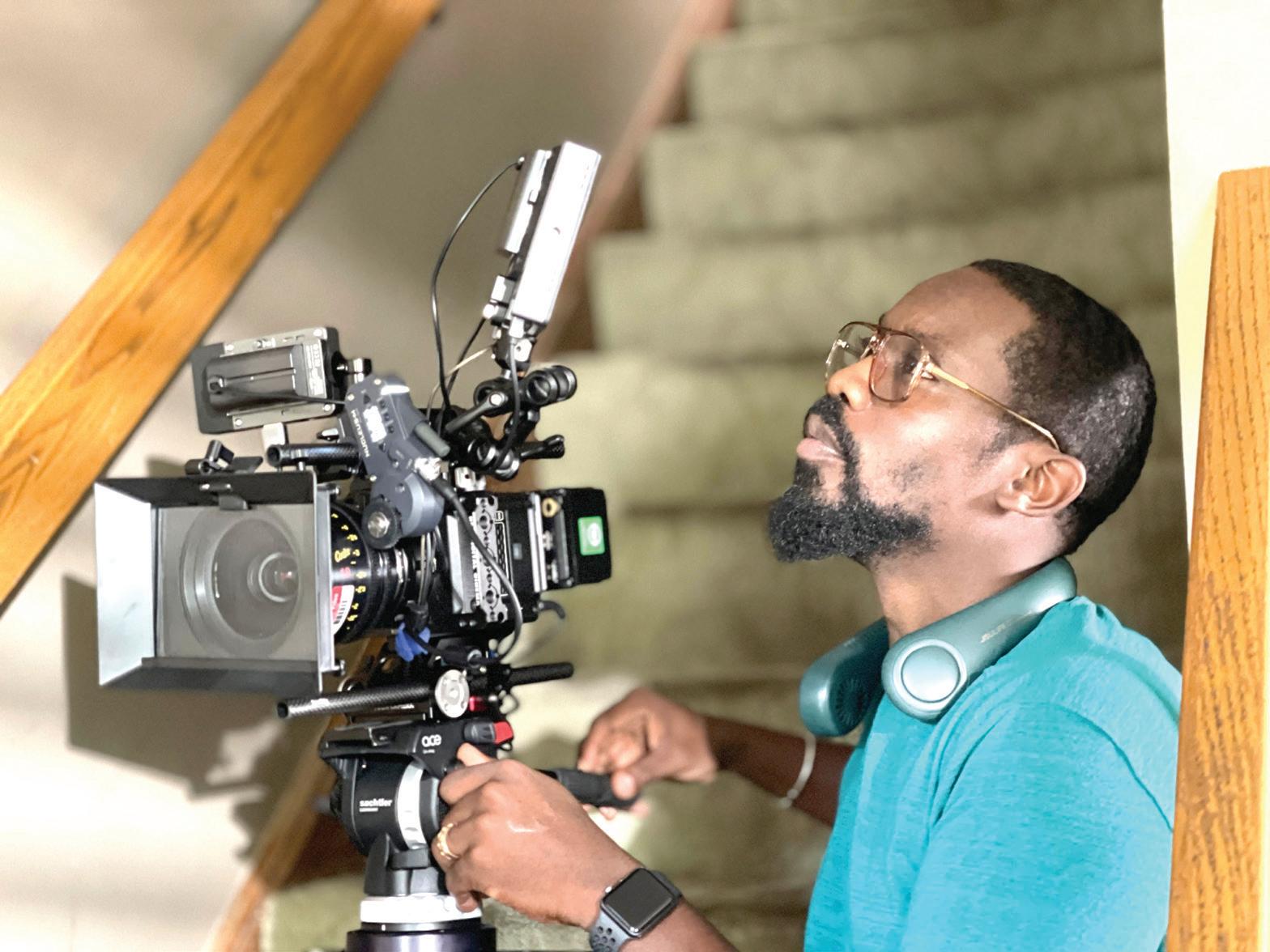
My vision for the Guyanese & Caribbean film industry remains the same: the implementation and enforcement of copyright & IP laws, the growth and development of the filmography, and an increase in the number of Guyanese and Caribbean stories being told visually. I would also love for Guyanese to easily come home and work without having to “pull strings or have connections.”
What is next for Mr Jackman professionally?
The work continues! I have a few projects in the pipeline, more stories to tell, along with building my business and brand - Bent Street Films.
Mr Jackman is an inspiration to many and his journey will continue to motivate people, especially in the creative sector as we continue to celebrate this beautiful journey, Life BEYOND THE RUNWAY.

ON February 2nd, 2023, Guyana and the world at large will come together to celebrate World Wetlands Day.
Wetlands are very important and dynamic ecosystems. They support unique plants and animals which interact with each other and the wetland environment to obtain the things they need to survive. As conditions change, the wetland as a unit change and so do the types of animals and plants they support.
Wetlands may be fresh, brackish or salty and can vary from large lakes to ponds, swamps, peatlands and bogs, slow streams, lagoons and estuaries. They also include ditches, water races, mining pits and hydro lakes.
The theme for the 2023 edition is “Wetland Restoration” which highlights the urgent need to prioritie wetland restoration in the world as we are losing our wetland resources faster than we are our forest.
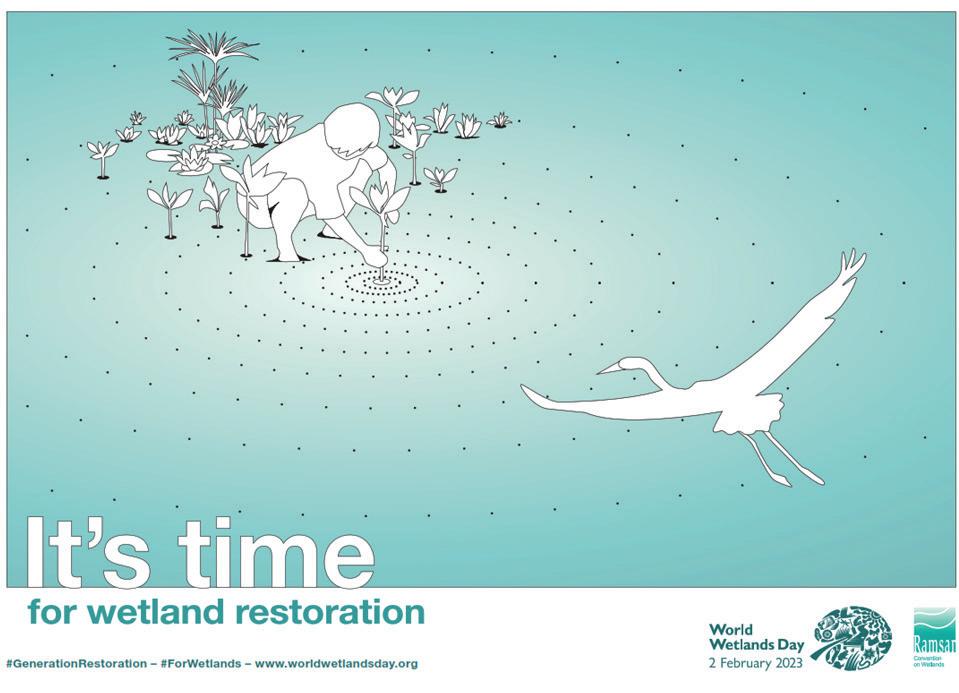
What value wetlands bring?
Wetlands provide benefits for people and society as well as services for the environment.
Wetlands are critically important ecosystems that contribute to biodiversity, climate mitigation and adaptation, freshwater availability, global economies and livelihoods. With the functions of wetlands having many diverse layers, there is a seeming lack of community education and awareness on the values of wetlands.
The value of a wetland and the services it provides depends on a complex set of relationships between the wetland and the other ecosystems in the watershed. A watershed is an area such as a river basin, estuary lake or underground aquifer where water drains from higher elevations.
Wetlands significantly benefit society as they create recreation and tourism opportunities, and hence jobs. They also provide food for people and a place for them to practise some cultural traditions. Wetlands also provide transport and research services.
Wetlands provide several ecological services. They serve as nurseries for freshwater and marine fish and store and purify water. Wetlands also replenish groundwater and store carbon. They retain nutrients and sediments and also support a wide range of animals and plants (biodiversity). Because water drains into wetlands, they play an important role in flood control.
Wetlands are home to many rare and endangered animals and birds and provide secure nesting, brood-rearing, and safe feeding areas. It is one of the most productive ecosystems found in the world, particularly when compared to ecosystems such as rain forests. They support numerous species from all of the major groups of organisms – from microbes to mammals.
Wetlands provide home for many bird species; migrating birds seek refuge in Wetlands.
Wetlands provide great volumes of food that attract many animal species. These animals also use Wetlands for part of
or all of their life cycle.
Wetlands in Guyana!
The North Rupununi Wetlands system is one of the largest wetlands in Guyana, the 54363 acres of land is dominated by the Rupununi, Rewa, and Essequibo Rivers, and include water bodies such as lakes, ponds and inlets.
Over 400 species of fish have been recorded in the area,
of protected areas including wetlands.
Let us continue to protect our wetlands!
This World Wetlands Day, it is important for us to recognise that wetlands can be “restored” where they are degraded, and are not wastelands. Let’s start by doing our part diligently to avoid further damage or to even reverse some of the damage caused to Wetlands.
leading to estimates of up to 600 species for the larger wetland system. The wetlands are also home to Guyana’s endangered giants, the Arapaima, Giant River Turtle, Black Caiman, and Giant River Otter.
Additionally, fish represents a major source of proteins in local communities within the region, while other wildlife species which depend on the wetlands for survival are used for commercial and daily subsistence.
The North Rupununi wetlands are also known for their rich indigenous culture and folklore and have significant aesthetic value, serving as a primary place of recreation for local residents. The rivers and waterways act as main transportation routes and serve as a source of drinking water. Water-loving palms and other vegetation are used for housing, craft making, traditional medicine and food for community members.
Guyana’s Low Carbon Development Strategy references wetlands, noting their importance to Guyana’s sustainable development thrust, and makes provision for the expansion
Here are some simple things you can do to help sustain our wetlands:
> Dispose of your waste properly;
> Reduce the use of fertilizers, pesticides and harmful chemicals;
> Do not use endangered or threatened species as food or souvenirs;
> Support and encourage conservation efforts - both national and in your community;

> Do not move wild plants or animals from one location to another; and
> Lobby for wetland protection policies.
You can share your ideas and questions by sending letters to: “Our Earth, Our Environment”, C/O Communications Department, Environmental Protection Agency, Ganges Street, Sophia, GEORGETOWN, or email us at: eit.epaguyana@gmail.com. Follow us on Facebook and Instagram and subscribe to our YouTube channel.

FROM PAGE XII
paused, and looked back at Sarah.
“You have a remarkable resemblance to someone I knew.”
“Oh,” Sarah responded with a casual smile, “It’s a common thing in the world.”
“Her name was Reshma.”
Sarah stayed composed though goosebumps has risen on her skin and she responded just as casually, “My name’s Sarah, a rank in the army.”
“Oh,” Mrs. Malhotra reacted surprised, “You certainly can’t be her then.”
Sarah smiled at her,acknowledging.
“It’s strange, the road life takes us down,” Sarah said to herself, lying in bed that night, “Because I was a poor maid she thought I couldn’t have become someone better.”
The next morning she sent a review to Aryan on his book of poems before leaving for a shopping trip with her friends. They needed cocktail dresses to attend a special social hosted
by the First Lady and browsed around a few smaller boutiques before stopping at a high-end one. It was another business entity owned by Mrs. Malhotra. A part of Sarah’s plan was to be seen as often by the woman to unsettle her.
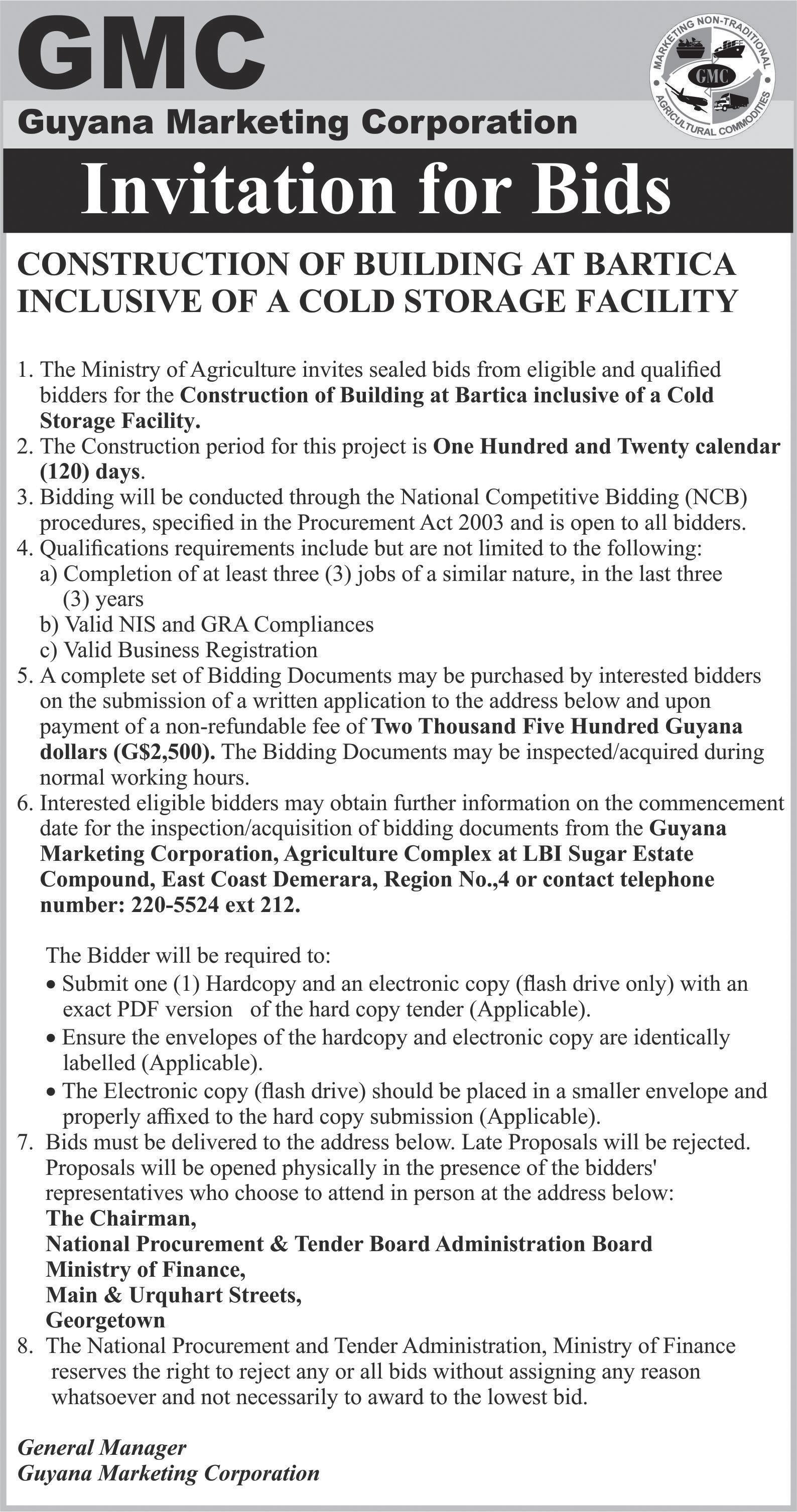
The prices of the dresses were way above what the girls could afford but they still bought a piece of fashion jewellery and were about to leave when Mrs. Malhotra arrived at the store.
“Oh, hi, I’m seeing you, ladies, again!” she exclaimed surprised.
“We’re on a shopping trip today,” one of the girls said.
“Saw anything you like?”
She was looking at Sarah as she spoke so Sarah answered matter-of-factly but pleasantly, “You have lovely outfits but it’s a bit above our budget.”
“Maybe I can discount something,” she offered.
“No, it’s fine, thanks.”
They left and Sarah couldn’t help smiling at the perplexed look on her ex- mistress’s face.
“The plan is coming along nicely,” she sighed with satisfaction.
It got better that evening as she came face-to-face with her abusers at the First Lady’s cocktail party at the State House.
To be continued…
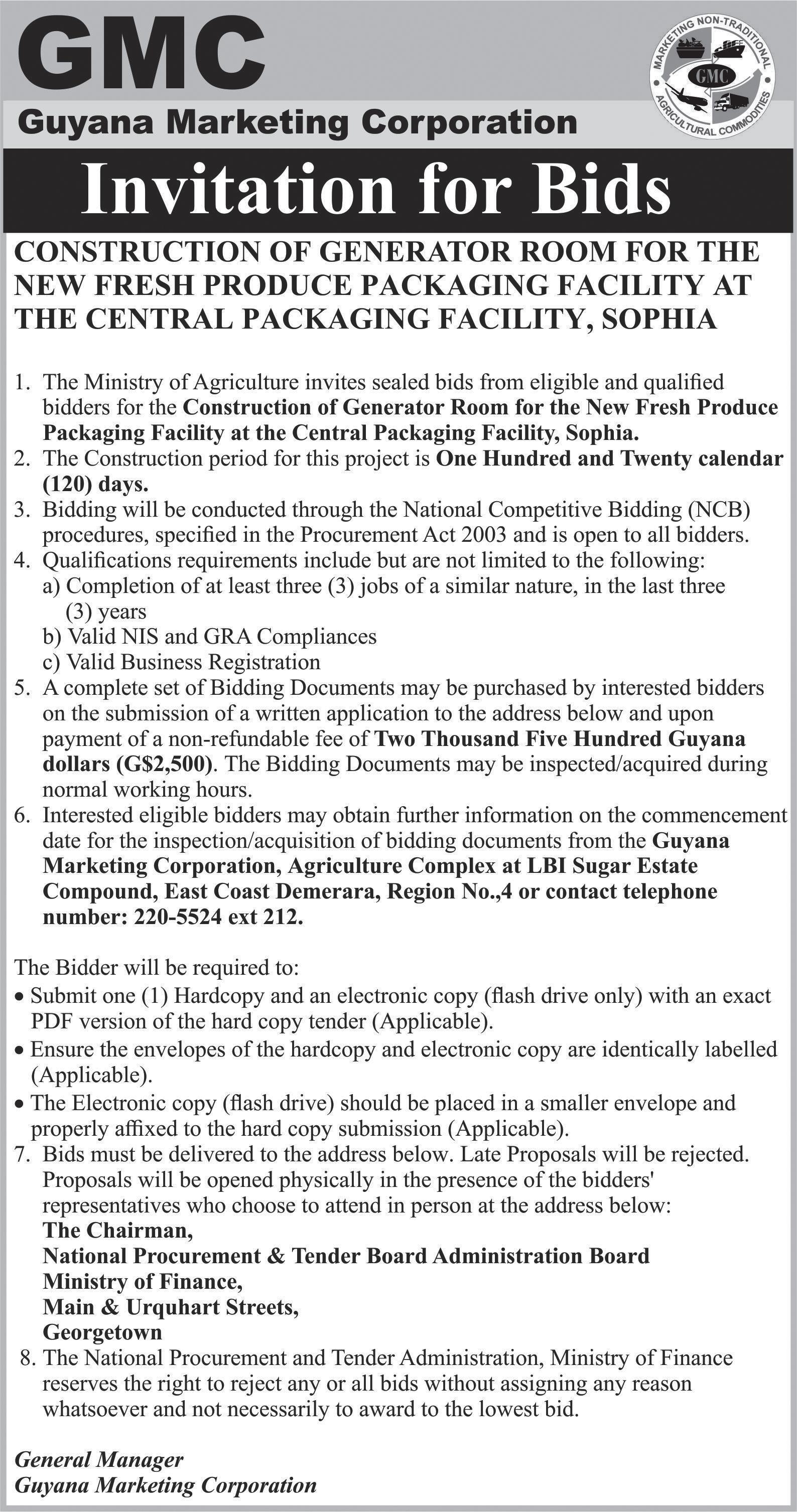
















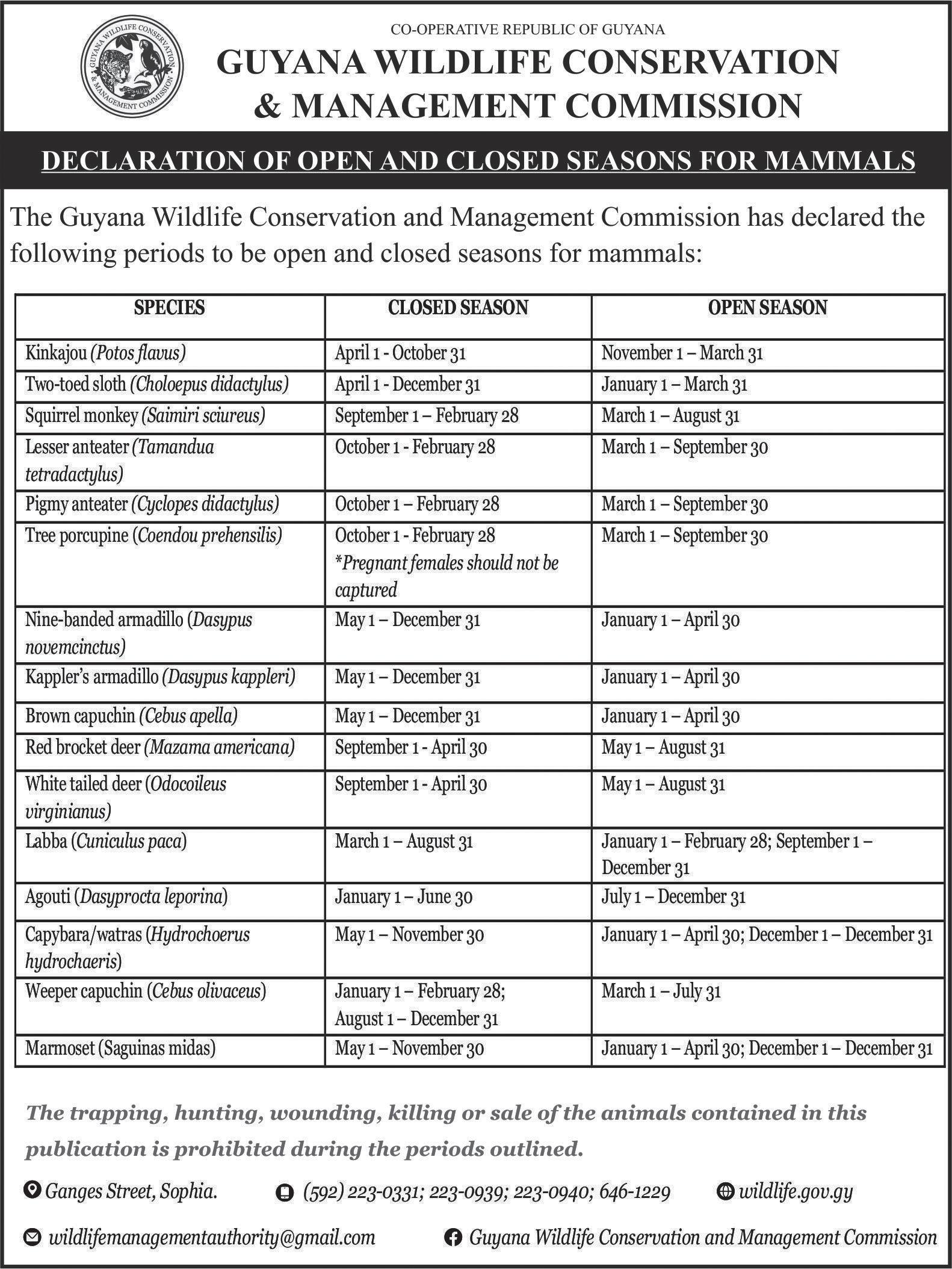
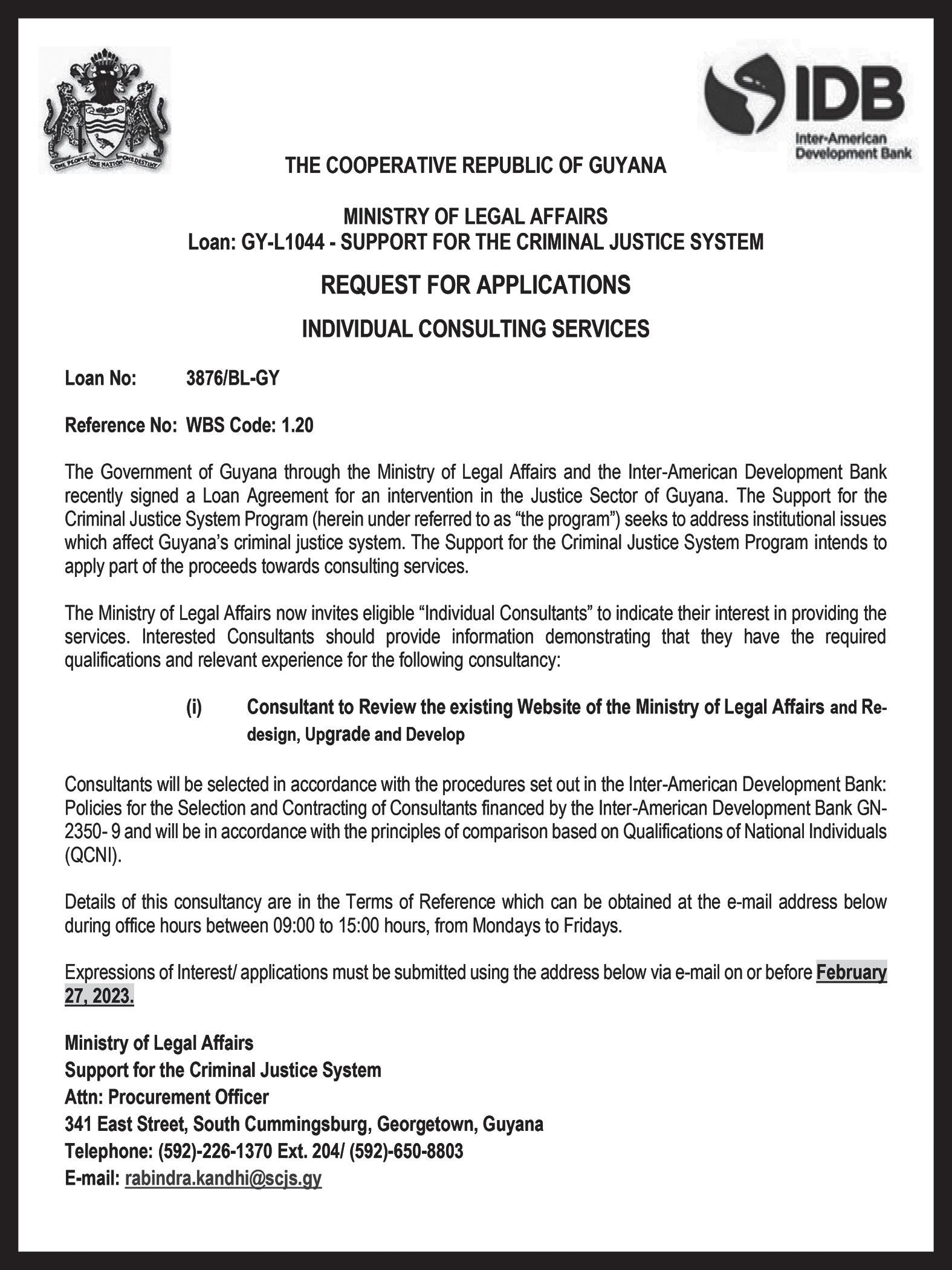












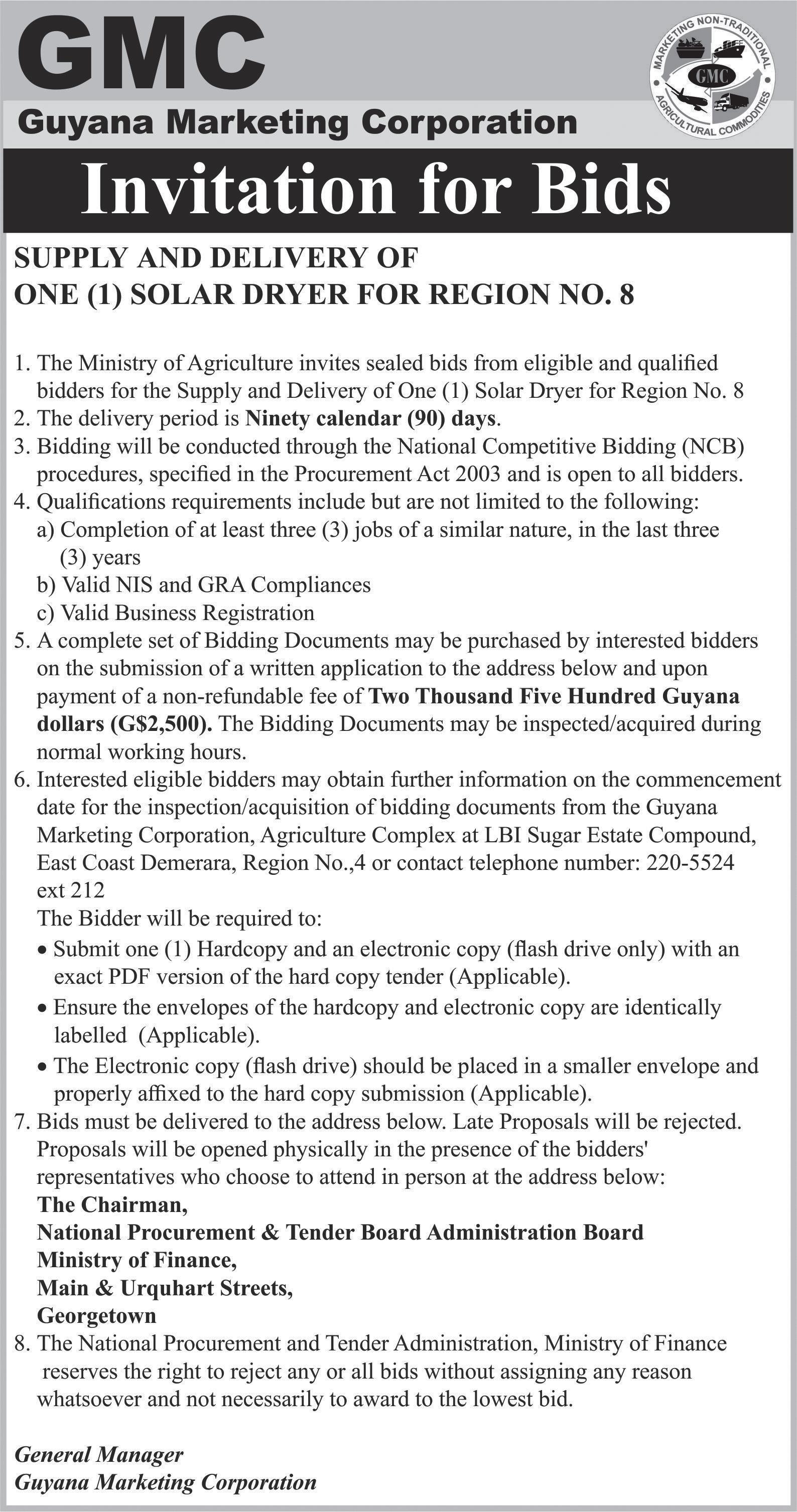
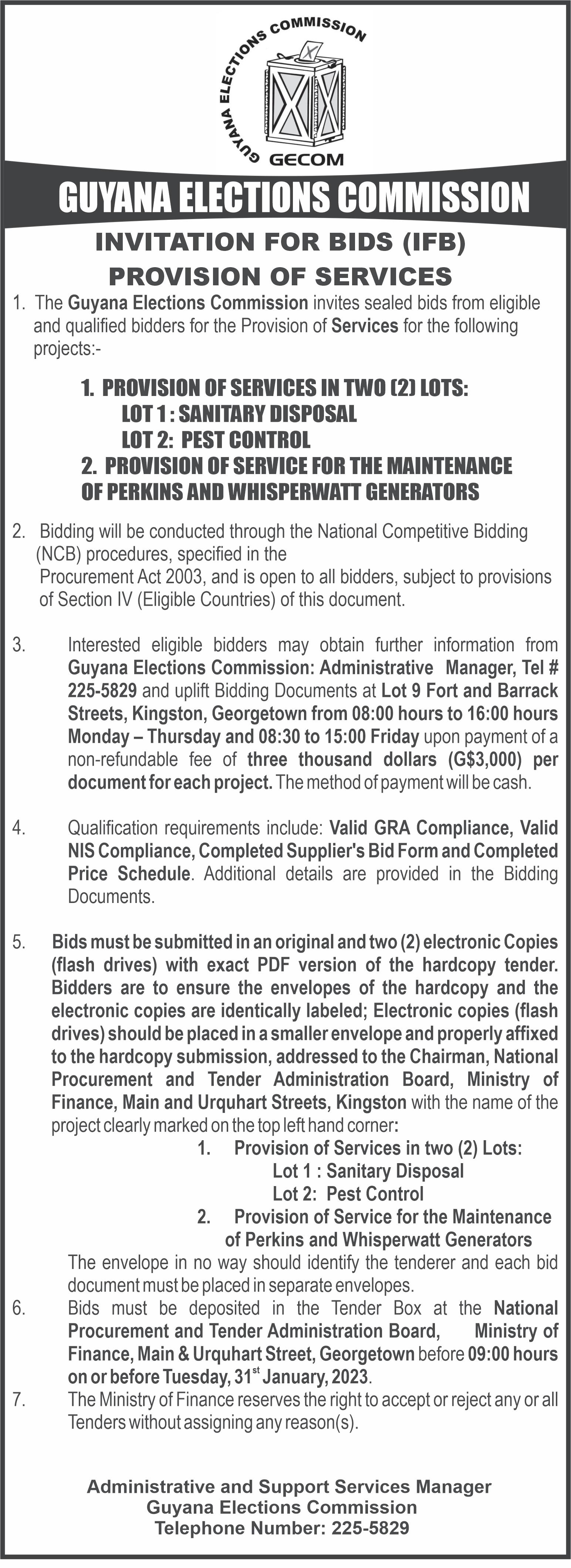




The trivial round, the common task, Would furnish all we ought to ask.
JOHN KEBLE (1792-1866) The Christian Year (1827). Morning
Dear Student, Welcome dear friend. You should exitthe secondary education system knowing how to speak effectively. Speech is a learned activity. When you recognise you have not been as efficient as you wished during classroom presentations when you “knew it but could not say it”or failed to convince your father in an argument at home, you are constantly being alerted that your speech is unable to do what you wish it would. Change unwanted speech habits now. Be wise.
January 27, 2023
Love you.
IMPROVING READING
Dealing with a report
Lord Percy Jones was murdered in the garden of is house some time between 7:00 P.M. and midnight of 15 June. The suspects described their activities on that night as follows: Lady Jones was having her dinner until eight, she then sat playing the piano to her daughter Mary until nine, watched the television and went to bed a little before midnight. Tom Jones had dinner with his mother and sister, but afterwards went out for a drive and didn’t get back until late. Mary had a headache and went to bed after listening to her mother playing the piano, but she couldn’t sleep. She heard her brother come in at eleven; at twelve she decided that a walk in the fresh air would help her, and it was then she discovered her father’s body. Her screams awakened Sir Harry, the dead man’s brother, and he came down to her and telephoned the police. Sir Harry himself had quarrelled with his brother just before dinner – so neither of them came down to the meal. Sir Harry says he was in his room all evening, but Jeff, the servant, claims he met him in the garden at about supper-time. Jane, the maid, served dinner and then Jeff helped her to clear the table and wash up, and they went to the cinema at nine, getting back at eleven-thirty. They had a cup of tea in the kitchen before going to bed just before midnight.
Something to Do
1. How did the victim die?
2. What were his relations with members of the family? Give details if you can make them up.
3. How many persons were in the home on June 15?
4. Which persons could have been in the garden between 7:00 and 8:00?
5. What motive could anyone have had?
6. How many different activities were going on between 8:00 and 9:00?
7. Who gave the least convincing account of himself?
8. Where was Sir Harry when called by Mary?
Where was he before then?
9. Give an account for each person’s activity between 10:00 and 11:00.
10. What suggestion do you have to arrive at a solution?
Making paragraphs hang together
If you fail to master the use of transitional expressions to introduce new paragraphs you can affect the flow of the entire message exactly as such failure affects smoothness. Bridge the thoughts in your mind as you consider the paragraphs of the following report and then polish them.
Hint: Use ‘at the same time’ at the beginning of the second paragraph and then use ‘as a result’ and ‘however’ in the third paragraph to let its thoughts flow.
The Report:
Yes, we have catered to a select group of customers over the years. These people appreciated the finest and did not complain about paying high prices.
We believe that the market for our quality products has increased dramatically. Over the past year we have been flooded with requests for our products from people we have never approached directly.
We believe that sizeable numbers of people whom we have never thought of as our customers have suddenly become our customers. These people cannot pay our standard prices as easily as our regular clientele. If our sales volume can increase by 20 percent, we can be able to lower our prices by at least 10 percent. We believe that both goals can easily be met.
As soon as you grasp the writer’s major ideas, you should recognise that everything else that is said, or should be, is designed to support the main ideas. You know that details help to fill in structure and lead to a better understanding of the writing. Details also tell a lot about the thinking of the writer.

In the explicitly written paragraph below note how the writer used sidelights to add colour and interest to the main idea, they are not separate ideas in themselves. The first sentence is the main idea. The others are highlights of it.
One of the most important factors in locating a manufacturing facility these days is the availability of trained workers. For example, Wellington in the northern part of the province would be a suitable site for our new computer manufacturing facility except for one thing. There is no ready supply of workers nearby. There is no university in the area which produces engineering and administrative personnel. There is no technical institutes or training schools. The high schools in the vicinity lack both comprehensive vocational training programmes and developed business courses. While transportation facilities are adequate, taxes are low, land is inexpensive, and the climate is outstanding, it would be extraordinarily difficult to staff such a facility in Wellington. Our only choice would be to institute training programmes, and those are always tremendously expensive.
Note: How supportive was the information that came?Were you able to rephrase by takingbrief notes mentally as you read? Did you also let your mind review the major points from time to time as you interact with the text?

1. Write a paragraph like the one above. You have the power to choose your own topic. Allow your study partners to air their observations.
2. Rewrite the following paragraph so that it flows smoothly.
Last year we closed our community centre to conserve church funds. This decision saved 7 percent on our operating budget. Friendly contributions decreased by 16 percent. A large proportion of this decrease can be traced to the closing of the recreational facilities. I would suggest that we reopen the community centre. Its closing cost us more than we saved.
 By Francis Quamina Farrier
By Francis Quamina Farrier
IT would be safe to say that the majority of Guyanese are aware that the town of Linden in Region 10 is named for President Linden Forbes Sampson Burnham, whose 100th birth anniversary will be celebrated next month - February 20, 2023. A much smaller number of Guyanese are aware that the border town of Lethem in Region 9 is named for a former British Governor of British Guiana; Sir Gordon Lethem. Of course, almost everyone knows that the village of Victoria, East Coast Demerara, in Region 4, is named for Queen Victoria of England. However, just a very small number of Guyanese know who is the “George” for whom Georgetown is named. That might be understandable since the teaching of history in the country’s schools is not as robust as it could be, according to some history enthusiasts.
Lots of the country’s history in classrooms covers a portion of slavery and indentureship. Critics advance the theory that although the Cuffy-lead revolution in 1763, and later the 1823 revolution, which was led by Quamina and his son, Jack Gladstone, principally on the lower East Coast of Demerara, never goes deep enough. For example, it is hardly ever mentioned that Cuffy had been generous enough to offer the Dutch slave owners, the lower portions of the colony of Berbice, which is adjacent to the Atlantic Ocean. The wisdom of Cuffy in that negotiation was for the freed former enslaved Africans to occupy the upper inland regions, which are fertile and perfect for agriculture. Those inland areas are also well above sea level and not prone to floods. The self-proclaimed ‘Governor’ Cuffy of Berbice was of royal stock in Ghana, Africa, before he was kidnapped and taken across the Atlantic Ocean to Berbice in South America, where he was then put into slavery.
King George lll’s reign in England commenced in 1760, just three years before ‘Governor’ Cuffy was, at the time, literally in control of the Berbice slave revolution of 1763. It must be noted that while Cuffy was enslaved in Berbice, under the Dutch, King George lll was reigning over many British territories worldwide. In fact, the reign of George lll was for 60 years from 1760 to 1820 - one of the longest by a British monarch.
Although King George lll suffered from mental health issues and was referred to as “The Mad King” he studied science
and was also active in farming - so much so, that he was referred to as “Farmer George.” It is known that the city of Georgetown,
which is named for him, is called, “The Garden City.”
Another of his achievements was, in 1761, when he purchased what is now
known as “Buckingham Palace.” King George lll also had a large library which contained 65,000 books. Citizens of George-
town could also be proud to know that the man for whom the city is named reigned for 60 years.

